#a product of events that were directly related
Explore tagged Tumblr posts
Text
Do you ever marvel at how many random things had to happen exactly when they did for you to be the person you are today? This is gonna sound wild, and it is, but if my mom wasn’t staunchly pro life when I was a small child (she definitely isn’t now lmao) I don’t think I would have any of the interests I do now, which are kpop, gay dramas, and dolls (this one is the common denominator believe it or not). And then I realize I wouldn’t have like ANY of my current friends or past online friends if it weren’t for the catholic church, which is not something I thought I’d ever say, but I guess I can thank it for shaping my entire being in a COMPLETELY different way than it intended lmaooooooo
#that’s such a weird epiphany I’ve just had…. literally who would I be if I wasn’t raised catholic…..#probably either better in every way imaginable or maybe actually catholic lmao#but the more I think about it like there are very few things that happened in my life that weren’t directly related to this one aspect or#a product of events that were directly related#or do u think we are all destined to be the way we are and life would have found a way to get us here even if things happened differently?#why the fuck have I gone existential at midnight on a Friday while scrolling my phone in bed lmao
0 notes
Text
40 sentences that will teach you more about nutrition than a $400,000 medical degree
From Brett Boettcher @brettboettcher1
40 sentences that will teach you more about nutrition than a $400,000 medical degree.
1) Meat, eggs and animal organs are the most nutrient dense foods on the planet.
2) Bone broth is loaded in collagen and helps repair the gut so you can heal from the inside out.
3) Saturated fat doesn’t cause heart disease, insulin resistance does.
4) Your ratio of triglycerides to HDL is a great indicator of mortality risk; the lower the better. ·
5) Protein is the most metabolically active macronutrient and it isn’t bad for your kidneys.
6) There isn’t quality evidence to show that dietary cholesterol impacts the cholesterol in your blood. ·
7) There is even less evidence to support that total cholesterol is bad for your health since it is inversely correlated to mortality risk. · 4h 8) Walking before and after meals is a great way to improve digestion and reduce blood sugar spikes.
9) Fiber is the last thing you need if you have IBS or diverticulitis.
10) Dairy is great for your health and its saturated fat intake is inversely correlated to heart disease.
11) Most nutritional recommendations were introduced based on profit margins, not health outcomes.
12) Calories in and calories out is all that matter, but some calories make you hungrier (sugar/grains). Other calories (protein) help you burn more calories.
13) Multi grain just means they took 2+ different terrible sources of grain and put them together into one product.
14) Cereal and bread for breakfast will spike your blood sugar and have you starving before lunch. Try Greek yogurt or eggs instead. ·
15) “Intuitive eating” and “listen to your body” makes no sense considering 88% of people are metabolically unhealthy and addicted to food. No one would say “intuitive crack use.”
16) Eating is a stress on your body; The less often you can eat, the healthier you’ll be.
17) Plan your meals around the protein source (with its natural fat) and add a small side of carbs if needed.
18) Eating for satiety is more important than relying constantly on willpower. Find filling foods and avoid foods with addictive properties (ultra-processed).
19) You don’t have to know how to cook. Grill a meat, sauté a green vegetable, bake a potato. Mix and match a million ways.
20) Eating many of the same foods every week isn’t perfectly optimal but it’s likely your best path to consistency and therefore success. ·
21) Becoming more insulin sensitive should be the focus of any health-related nutrition plan.
22) Salad dressings are one of the worst things you can eat for your health. High in calories and inflammatory industrial oils.
23) Eating 5x per day won’t boost your metabolism. If you are trying to gain weight, it’s an excellent strategy.
24) Bacon can be healthy, just avoid the processing with nitrates.
25) Cottage cheese and Greek yogurt are two of the best sources of protein per calorie.
26) Carbs are beneficial around a workout. But many sources of carbs are processed and easily overeaten. Focus on single ingredient foods.
27) You can’t be healthy at any size no matter what your mother or liberal arts professor said.
28) Eat a high protein meal before attending social events that are filled with junk food.
29) If eating out, order the food with the highest protein content.
30) The #1 reason people fail is that they don’t prepare. Meal prep, meal plan, have ready to eat protein sources. · 31) The food you eat directly impacts your mental health and processed foods are correlated with depression and mental illness.
32) Processed foods have been engineered to be as addicting as possible. Your taste buds can be retrained with natural sources.
33) “Plant-based” foods are made in laboratories and are an easy way to sell overpriced junk to consumers at high margin.
34) Eating 1 gram of protein per lb of ideal body weight daily will do more for your body composition than spending 30 minutes on the treadmill.
35) When in doubt, if it comes from the center aisles of the grocery store or has more than 3 ingredients, it’s not good for you.
36) Many foods labeled as “keto” “paleo” or “high protein” are far from meeting the intended definition.
37) Your gut is responsible for 70% of your immune system; feeding it sugar and other inflammatory foods is making you sick now and later.
38) Genetics play a role but over 90% of the country has a resting metabolism within 500 calories daily. Being fit is possible for everyone.
39) Flipping the food pyramid upside down is closer to healthy eating than the traditional suggestions.
40) Eliminating drinking your calories is the first change to make when trying to improve your health.
191 notes
·
View notes
Text
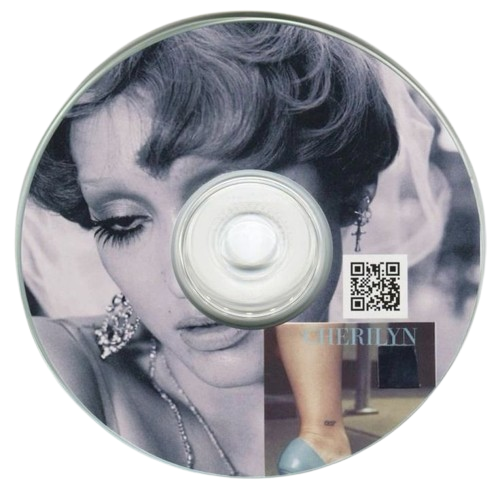
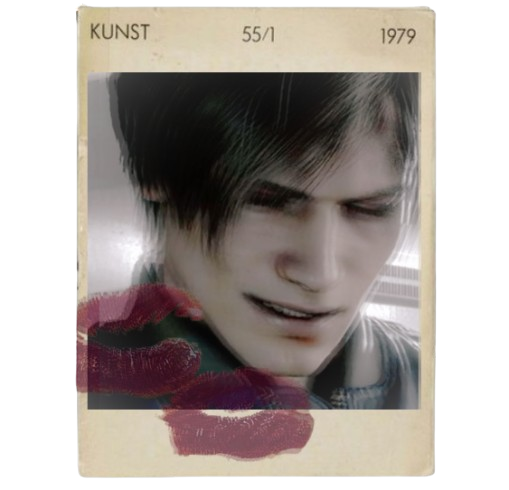
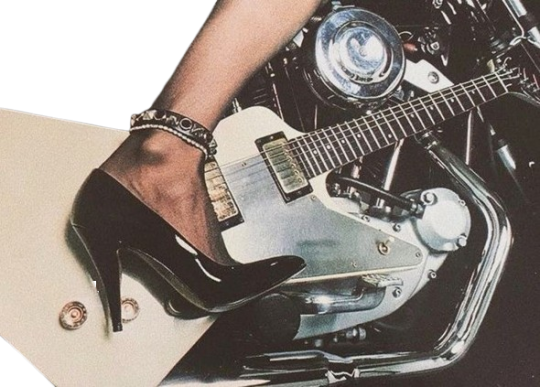
TOMB FOR TWO
Rockstar Leon S. Kennedy x model reader | AO3 18+ MDNI. smut, female reader, drugs and alcohol addiction implied, Leon is scumbag i guess, blowjob, use of coke, deepthroat i guess, dirty talk. tags: @ivmp words: 2,934
notes: so.... dont do drugs/alcohol and idk i feel like i need to clarify, some stuff here i heard in real life directly from insufferable men, so don't interract with such kind of people for ur own good.

Leon loves ladies, he was always the kind of man who loved every woman, if she was attractive enough to his taste of course. Also, he considered himself a nice guy, but a lot of girls didn’t get him. It got a lot worse when he cheated on his ex-girlfriend, after that nasty breakup and a slap he received, it felt like she had put a curse on him. Maybe he is cursed, it would explain why his attempts to form established relationships always failed. At least the passion for music was always with him, no matter how hard it was for him and it has helped indeed him in many areas; gaining more ego and becoming finally a rockstar, which certainly has helped him find lovers to warm his bed.
In his mind, he has already created his own list of preferences, models were always a big ‘no’ cause pretty dolls in the majority were the most annoying ones in his honest and ‘humble’ opinion. A lot of them are anorectic, and Leon doesn’t need a girl whose only hard thing in her mouth would have been his dick. Also, pretty women are usually really intimidating and have high standards, he doesn’t want to risk a possible denial. Cool guys don’t get hurt.
But that list didn’t help him at all, it didn’t prevent him from getting involved with you so quickly. A model and you looked sick for his tastes, dark circles under your eyes and lack of any vivid light in them too. He put two and two together, probably you did often drugs and he didn’t know which ones, he never asked. Your first appearance was at one of the events where his band performed and you were bored to death, gaze leaped around the surroundings, trying to find something more interesting to linger on than whatever this place is. Your pupils were dilated as hell and your jaw was tensed, making those useless movements and biting inside of your cheeks. He didn’t give much thought and he was drunk already while your fingertips were tracing his jaw and a sparkle in your eyes was enough for him. And after all, you agreed to come with him. His expectations weren’t high, another quick one-night stand he would forget about, but after stepping into his apartment you got sick. Vomiting in his toilet until it became quiet and he decided to check, after all, he is a good guy, really. And he doesn’t need a corpse in his flat. Pulling your hair to tilt your face towards him and witness your exhausted expression; your lips parted with saliva glistening on them and circles under your half-lidded eyes got more evident and darker. All this combined led to him having the hardest boner he has ever had.
Your presence in his life only gave him a boner and a headache, also an urge to strangle and shake you like a doll, but he never had enough strength to leave you behind and forget everything related to you. He tried, his mind would fill with thoughts about you, leading to jerk off a lot when he is sober and not recording music. His drunk ass would always crawl back to you, after feeling your eyes on him everywhere even when he was smoking out of a bar. Those billboards with your face, promoting some products and looking ethereal, without sickness all over your face, feeling your gaze as if it was only directed towards him. Those photos were the reasons his legs always lead him to your place, finding you already hammered as much as he is, if not worse, more than happy to let him spill his load in your mouth or pussy. After all, Leon is a simple man, not a romantic one, romanticism has died within him after that ‘undeserved’ slap.
Needles were a big ‘no’ for you, explaining they can leave marks and they are scary, also those are used by drug-addicted people which you believed you aren’t. After all, you like them thanks to your dear and generous friend who shares them with you. While Leon was an old-fashioned man, he has always preferred booze, even after finding himself in weird situations without any memories, only with pain pulsing in his head and hangover. You didn’t understand that at all, it has never brought you any good sensations, also alcohol has a distinct smell you have always hated and there is nothing sexy about it. That’s why Leon was always simple in your eyes, a rockstar with little to no existent layers in his personality; one hand with the bottle and the other one on his dick. In the end, both can destroy many lives.
Of course, whatever you both had going on gave you the possibility to visit his concerts without spending a penny. Leon has never asked if you like his music though, but still, he believes it is good, after all, there wouldn’t be a big female fanbase over anything? So there was never a thought behind his eyes to consider your tastes. Besides, you didn’t attend often, always brushing off your runway shows to which he was never invited. Not like he needed to be there, but still it made him feel a little bit bitter. Other reasons were similar to ‘I don’t want to’ and if to be honest, this isn’t a valid reason for his calls to be ignored.
This time you didn’t have other options, nor Leon would let you skip his performance. Soon understanding it was a mistake, you shouldn’t be here, cause during the entire concert his attention was drifting in between his music and you, trying to find you among many women. Every time he notices you not listening to the sound the instruments create, it fills him with bitterness and annoyance. Time passed slowly, finally finishing performance and emptying his flask quickly. He was tempted to leave you alone, to not give any warning, and get another girl from the crowd, but also this would be risky for a lot of reasons; first, he doesn’t have any condoms, and second, groupies are annoying and he doesn’t want to deal with them for a quick fuck today. The only solution he came across was to leave this place earlier and push you into his car.
The ride is okay, the only noise is some music coming from the car stereo. He twitched a little bit with the switch before, but he didn’t really listen to whatever was on until he recognized his own song. A nice touch. “Your music sucks” you say, breaking the silence which was only filled with his voice coming from the radio. This is new for you, music is his job, and what does a model know about it? His face turns to look at you for a brief moment, he is driving and he doesn’t want to get himself killed cause of you. “It doesn’t.” Leon protests quickly, but your voice interrupts him again, making him groan and want to stop the car. To strangle you. People love him! His groupies would be green with envy if they ever got to know about you. “It does” you say, resting your chin on the palm of your hand and looking through the window before rolling it down and letting fresh air coming in. The wind noise is ear beating, enough to give him a headache, nor does it help with his mood right now. Bashing noise to his ears, but you don’t care. Your voice fills the room, too bad it is loud enough to catch on and it is not mixed with the sound of the wind. The road is dark, and it is already hard to drive after consuming alcohol, but your voice makes this worse. “Your music never changes, mundane, same melody. Boring even, and generic. I don’t like it”
Then you stay silent, Leon’s mind is buzzing with only two thoughts in it: what a bitch you are, how he wants to shut you up with his dick and he needs to calm down, to let off steam. That’s three or four though. Math wasn’t his forte.
He pulled over his car, almost stumbling over from it as the chilly night breeze hit his face, filling his lungs. Refreshing and sobering in some way. It is dark, he didn’t even notice how he moved to your side and opened the door, looking down at your face with a blank stare, while his slow mind keeps processing your words. You shift on the seat of the car to face him with a raised eyebrow, looking so annoyed and confused by his attitude. Leon isn’t sure why he was hurt by your words, but this look was not new for him; every time a sentence would leave his mouth, your face would express an annoyance as if he just said the dumbest thing possible. You are probably just trying to mess with him and this always made him hornier, his cock would start stiffening in his jeans and even this isn’t an exception, like one of Pavlov’s dogs he is. Or this is just alcohol talking.
The inside of the car enlightens your features and it is maybe the only thing so bright in such a dark spot right now of the road. His index finger brushes over your lower lip, tracing the contour of soft flesh beneath his thickened skin after years of playing guitar. He can’t help but stare at your mouth, admiring the lipstick on it, looking clean and emphasizing the shape of your lips. Too bad his digit smeared the color a little bit over the form. You don’t notice that thank God, cause he doesn’t need another comment from you. Silence makes you much prettier. Your hand reaches for his thigh, brushing over the inner part and the annoyance in your gaze quickly changes to interest as it slowly travels down to the bulge which started to form already. Leon doesn’t know what magic you use on him, cause it is much easier to get even half-hard dick with you, while the majority of girls would waste his time and then cry about not being able to turn him on. He blamed this trouble on them, not on his best friend (booze). To not waste much time, you tuck out his cock from his pants.
Your fingers envelop his half-hard length, before stroking, spitting a mouthful of your saliva down on it. Spreading over the hardened skin with a quick and easy motion of your hand, your touch lingers on the spot below its tip which makes him groan lowly. His fingers tangle in your strands, pulling your face closer to his cock as a silent plea to sink your mouth down around him.
“Don’t play, come on,” Leon says, not noticing how his voice got hoarse. “Give it a kiss, doll” In the past, you would be annoyed at his words, but tonight you don’t mind, enjoying how pretty he is when he wants to shove his dick down your throat. Your lips press against his tip and kiss around it, teasing him and licking away precum, finally bobbing your head down. The warm and wet heat of your mouth envelops his cock, your tongue flicks along the shaft. Leon can feel himself getting harder and his hips buck back in response, letting quiet groans. But the bliss didn’t last a lot, you pop out his cock and slap it against your tongue, rubbing against your lips while keeping eye contact with his eyes. The sight is dirty, lipstick leaves its color on his wet and throbbing dick, intensifying the moment.
Until he noticed there was something under your silver sequin top, that caught his gaze only now. But also he doesn’t know what it may be, wondering silently and fixating on your chest. Or he is just seeing things, until your hand slightly lowers the edge of fabric to take the bag with white powder, satisfying his curiosity. The timing made him frown, almost convincing himself you could read his mind. But also, what should he have expected? Boobs would be nice, actually.
He isn’t going to deny a pleasure to see them. That’s why his hands reach for the edge of the fabric, pulling down to expose your breasts, nipples get harder at the contact with the cold air of the night. His fingers knead soft flesh, thumb and index pinch nipples to evoke your moans out, observing your face change even for a brief moment because of him until you slap away his hands. It was nice while it lasted. He watches how you make a thin white line on his cock, almost dripping some on your skirt, and letting a curse fall from your lips. If to be honest, this is his first time seeing you doing drugs in front of him. Also, there are too many ways to consume Coke, he heard about how some women shove it in their vagina, but he isn’t sure if this is true. You lean down and snort it away with an ‘ah’ leaving your lips, while rubbing your nose and blinking messily, trying to shake off some tears forming on your waterline. He was tempted to try, but you don’t share.
“Fuck, that was hot” Leon comments, letting a low whistle. Your hand pumps his cock in a steady rhythm.
The little pause was over, with a giggle and lightened expression on your face, coke does wonders. Your mouth starts giving kisses, before sucking on the tip more eagerly than before, and your tongue swirls in a circular motion around it. For a brief moment, you shift to the underside too by flicking over that sensitive spot, making his hips buck, pushing your head deeper to sink you down along the length. You can feel more saliva pooling in your mouth, slobbering over his cock now, and spit drips down onto his balls. The Coke has its visible influence now, dilated pupils are directed into his blue eyes, keeping eye contact. He knows that state of yours, being happy and confident to do anything, clinging and not letting him go away until powder’s effects don’t start to weaken. Your heart is beating loudly in your ears, not hearing those loud suction noises your mouth does which he adores. Leon’s fingers tighten his grip on your hair, tugging and pushing your head deeper, his tip kissing your throat and he groans, while your nose rubs against his happy trail. Your jaw is more relaxed, taking him deeply and you try to swallow the excess of saliva and his precum, so your throat tightens around his cock, he can feel you choking on his now twitching arousal. It is useless, you can feel saliva dripping not only on his sac now, but also from the corners of your mouth down to your collarbone. Leon pulls your head away before slamming with quick motion his hips against your face again. His cock is slick with your saliva, sloppily moving out and back into your mouth, constant stimulation of your tongue flicking against his head and at the base made his balls tighten signaling that his orgasm is approaching. Initially, his own moans are breathless, slowly starting to increase in volume, as he took more control in his own hands. His movements are erratic, the sight of your teary expensive mascara and lipstick ruined by him and leaving marks on his cock is one of many reasons to be alive, he thinks.
“Do you see yourself right now, huh?” He moans, shaking his head with disbelief, as you keep sucking him off sloppily, making more wet sounds that intensify and fill the air between you both. His voice is at the edge of quiet whine, needy moans reach your ears. “Yeah, that’s it, all you have to do is let my cock just slide in and out of your pretty mouth, doll”
He slams his hips for the last time burying his cock deep into your throat, the head grinds before twitching for a last time spurting out a load of cum. His fingers grip tighter, almost painfully, not letting you pull away and spit it out, swallowing the bitterness that fills your senses, making you gag more. The booze diet isn’t the best one. He lets you pull away, your tongue for the last time brushed his tip and he stands still, his breathing is unsteady and chaotic, while you wipe away the remaining saliva from your skin.
“So….” Leon interrupts the silence between them, he is speaking without giving too much thought, and he quickly pauses for a second, trying to organize a decent sentence. “What about… something formal? Between us I mean” Your eyes don’t even linger on his face after his question, the so-known-annoyance returns to your face and you pull down the sun visor to fix your makeup. “Ew, no” your voice expresses disgust at the thought of being more than just a quick hookup, you roll your eyes as your thumb cleans the smear of your lipstick. Your nose twitches still, even if the effect of the drug starts to lessen. “I don’t like you like that” “It was a joke,” he brushes off quickly, feeling his own body recovering from orgasm and wanting to get away from you, so the bitterness and disappointment would not irk him so much. “For God’s sake, smile at least.”
Story of his life, nothing new.
#leon kennedy x reader#leon kennedy smut#leon s kennedy x reader#leon kennedy x you#leon s kennedy x you#leon kennedy#resident evil smut#resident evil x reader#leon scott kennedy#re4#resident evil 4
174 notes
·
View notes
Note
Any games with a lot of collaborative world building?
THEME: Collaborative Worldbuilding
Hello friend! I have so many games for you. At the end of this recommendation post is a list of other posts I've made that are directly related to this theme!

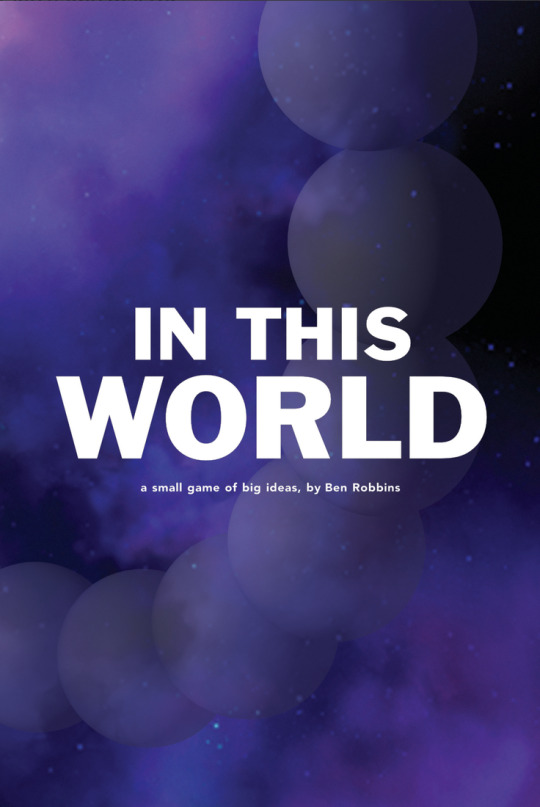
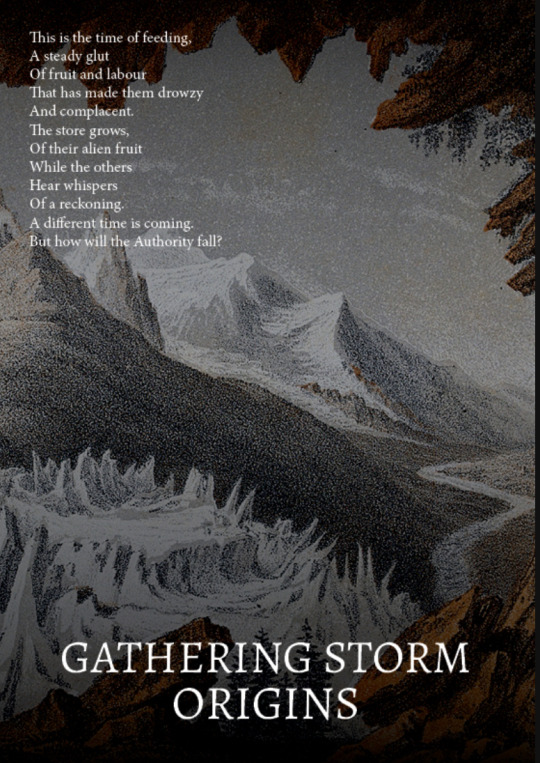

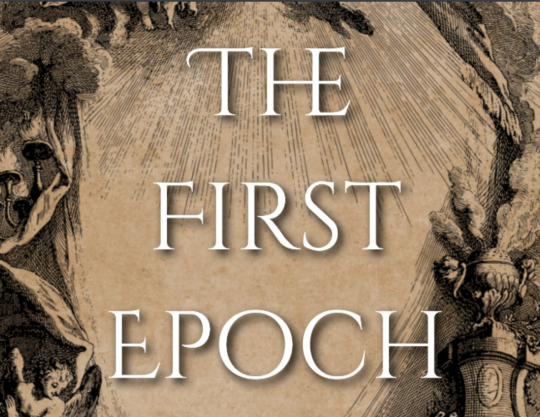

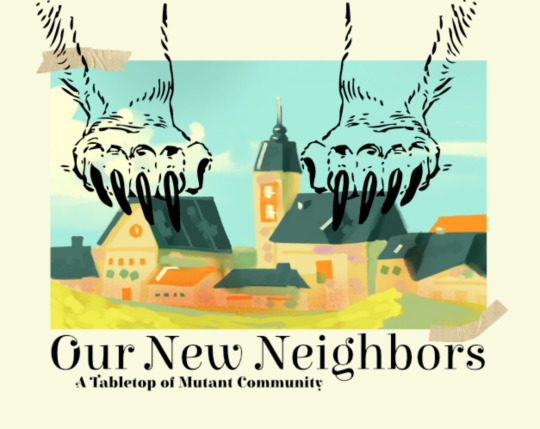
Data, Nerves + Acquisition, by Ben Newbon
Based on the Beak, Feather & Bone SRD, this game gives you a way to build out your world and develop communities within it organically, all the while creating your own stories and lore to fill in the gaps.
Built on another critically-acclaimed city builder, DNA uses a deck of cards to generate a city and the factions that live within it. Players will generate Data, which corresponds to a person or faction; Nerves, which corresponds to the faction the characters interact with; and Acquisition, which represents what each new faction’s goals are. At the end of the game you should have a city that is criss-crossed with territory, relationships, and threats that give the city a unique feel.
Data, Nerves + Acquisition is designed to create a cyberpunk or futuristic city, although the creator states that the setting is still rather flexible.
In This World, by Ben Robbins
Nations have borders. Police have badges. Dragons breathe fire. You work for money. That's the world we've come to expect. But in this world—the world we create together—we can question those assumptions and imagine alternatives. And instead of just making one world, we'll make a whole string, each exploring a different slice of what could be… all in a few hours.
In This World is a fast game of big creativity, by Ben Robbins, the creator of Microscope and Kingdom. It is designed from the ground up so that anyone can play it, even someone who has never played any kind of story game before, and have no problem just jumping right in.
It overcomes the usual challenge of inventing ideas out of the blue by starting with a framework of real world facts, things we already know, and then inviting players to stand those ideas on their head and imagine how the world could be different.
In This World is designed for making more than one world at once, using a series of speculative questions - a number of what-if’s. What if vacations were much more common? What if everyone in this world travelled by train? What if this world had libraries for more than just books?
In This World is also designed to be no-prep and GM-less, which gives everyone equal control over the creativity of the world, and doesn’t require a lot of work or set-up beforehand.
Gathering Storm: Origins, by David Blandy
This is the time of feeding, A steady glut, Of fruit and labour That has made them drowsy and complacent. The store grows, Of their alien fruit While the others, Hear whispers Of a reckoning. A different time is coming. But how will the Authority fall?
By placing your characters on a faraway planet, Gathering Storm: Origins hopes to tell a story that has parallels to a real series of events that happened in Geneva, Switzerland in ours. It uses a deck of cards and an oracle to create characters as well as events that these characters will have to navigate to determine how the people of your planet will react to the actions of an Authority that demands the production of their Alien fruit, even though that production is to the planet’s detriment. If you want a futuristic metaphor for political actions that have had a very real effect on our world, you might want to check out Gathering Storm.
Planetes, by Cambilla Zamboni
Welcome to Planétes, a language-learning tabletop role-playing game in which you will create cities and communities, and you will become Dwellers and Wanderers. While shaping and exploring your communities, you will discuss and compare your values, and decide whether to stay in your city or explore new ones. Throughout this process, you will use the target language to interact with other communities, enriching your perspective and reflecting on your experience without relying on familiar structures.
This is not just a roleplaying game - it’s also a language learning exercise meant to be used in a room of language learners, and it’s designed to work with very large groups. Multiple tables create their cities and their characters, and then each city sends one Wanderer to another city to visit and learn about the culture. Wanderers will ask the new cities questions, and the city members will do their best to answer. The Wanderers return to their home cities with the new information, coloured by their character’s worldview and values. At the end of the game, each character will have to decide to either stay in their city of origin, or move to another city - and the migration that happens will change core elements of the city.
Planétes exists on a single brochure, making it easy to print and hand out to a large group of people. If you want a game that works for large groups and can double as a learning exercise, I recommend this game.
The First Epoch, by Tib Winterfield.
Work with your players to build out the pantheons of your world, give them the gift of creation and allow them to put their own mark on the world.
Completely system agnostic, a light-weight and simple game to help you build a co-operatively build your campaign world.
The First Epoch is a world-creation game from the perspective of the gods, creating a mythology alongside a series of truths that will exist in the world that you create. Each player embodies a god and chooses specific domains. Every turn, one player will establish truths about how their domains work, and then roll Fate dice (dice with + and - on them instead of numbers) to determine the impact these truths have on the world. At the end of the game, there is a twist that will challenge all of the gods, and leave you with an end-state that you cannot predict.
If you really like mythology and want to re-write physics, magic, or how death works in your game, this is probably the game for you.
City Upon A Hill, by Hunter J Allen
City Upon A Hill is a table top collaborative city building game for any number of players. It requires a full deck of playing cards and note taking tools.
This is a game about building up a city and watching it fall. Work with your friends to populate a city full of life, commerce, legends, traditions, and secrets, and then bring the city to its knees through death, conflict, deficit, and crumbling infrastructure. Bring the city to a peak during its Boom era, and guide the city down to ruin in its Bust era, creating a setting rich in history and tragedy. Draw cards to decide the city's fate, working together to weave a tapestry that tells the story of your City Upon A Hill.
City Upon A Hill is divided into two phases: Boom & Bust. Boom follows events and details that define the city’s success, and reflects a heyday of some kind. Bust marks the decline of the city, through a series of unfortunate events and changes that affect the citizens’ well being. The game is played using a deck of cards, with the first Joker draw sparking the transition to the Bust, and the second Joker draw ending the game. I think this game is a really interesting way to create the history of a once-great city, baking in information about industry, tourism, infrastructure, and economic changes that affect the city and likely also the world around it. If you want a game that has somewhat of a melancholy ending, I recommend City Upon A Hill.
Our New Neighbours, by Whimsy Machine
In this small village, at least a few hours’ drive from any city of note, a small community has grown a bizarre polyp. As spring turns to summer, the roiling heat hatches the eggs of a startling development. New neighbours scuttle and squirm and gallop from the bushes and dirt and into unlocked sheds, messy mudrooms, and stinky attics of the village. Mutants are here, they’re weird, and they’re not sure what to bring to the potluck.
This is a collaborative storytelling, community-building, and map-making game, telling the unraveling tale of a village beset by oddities. The players take on non-specific roles, occasionally dipping into the voice of individuals, to weave something larger together.
Our New Neighours uses both a deck of cards and polyhedral dice to flesh out your map. The dice are first rolled onto a piece of paper to determine where on the map specific locations can be found, and the numbers rolled will determine how various places feel about the new arrival of Mutants. The cards are used to both generate mutations for your characters, as well as their needs. Once you have these defined, the cards will be used to generate events that may help or hinder the mutants - and prompt you as the players to respond.
Other Recommendation Posts To Check Out…
Two-Player Worldbuilders
World-Building & Roleplaying
Town-Builders
Map-Making Games
95 notes
·
View notes
Text
i think OFF is getting a new, official english translation alongside the fangamer merch releases in december.
my reasoning: i've been digging through the website given in the teaser. right now it's an email newsletter signup page; this makes sense, given that the URL needs to be live to build hype up to the event date.
on this website, there's a rotation of quotes from OFF that are in english. and apparently, along with the very rare and completely new quote that pops up on there sometimes, the quotes the website flashes are not a match to the v3 english fan translation... even though that's the only way to play the game in english. (yes i know about forgotten dreams)
i have OFF english translation v3 open in RPG maker 2003 right now on my laptop. and using some web dev magic, i also have the official text from all of these dialogues. come find out why i've slowly been going insane over the course of today. (it's thanksgiving 2024, if you were wondering. also this post is probably best viewed on desktop.)
here's a quote from purified.zone, the teaser website from fangamer.

Uh... will you find the leader of the specters? Well... it would be great if that were possible... Well... yes...
and here is that same quote, directly from the r3proj file used by the OFF v3 english translation.
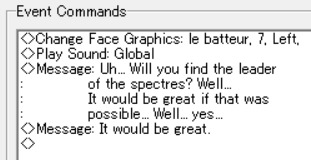
Uh... Will you find the leader of the spectres? Well... It would be great if that was possible... Well... yes...
sentence-case capitalization and tense changes aside, the move from "spectre" (european english) to "specter" (american english) immediately jumps out at me. (i say european, but i don't know the translator's nationality. i just know that professor layton did that with one of their games, last specter in the USA and last spectre in europe.) the important part being, mortis ghost is belgian and speaks french. the original game had it as spectres, and either the fan translator was european or preferred that spelling and kept it. fangamer, however, is an american company -- and the spelling of "specters" on their site is specifically in american english. (only we would fuck up a perfectly good word. it looks way better with the re.)
how do I know it wasn't just a typo? because there's two lines with the word specter in them on the site! screenshots upon ye!

You've come to eliminate the specters? That's good news.
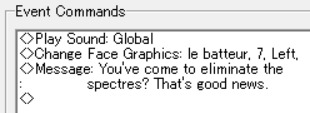
You've come to eliminate the spectres? That's good news.
not just someone getting carried away on copy, then -- this is an intentional change. specifically, i think this difference can be explained by these being two subsequent translations, first v3 and now the website/new english translation/steam release/v4, with differing guidelines for their finished products. they're entirely TOO similar to not be related, to me -- forgotten dreams (2023) is a good example of a vastly different english translation of the game, and proves that one can be done. but if you have a widely beloved english fan translation that already exists... why not just get the rights and spice it up a little with some fresh editing?

So, will the final verdict be handed down soon? The employees here are certainly in need of your muscular wrist...

So, will the final verdict soon be reached? Numerous employees are certainly in need of your muscular wrist...
these changes feel like they've been made by a copy editor; the meaning is the same, but the structure flows better. "soon be reached" fits a latin language (french) phrase structure where the verb goes at the end of the question, whereas "be handed down soon" is a more natural english phrasing, at least to this native english speaker.
some changes, however, are stylistic in nature. i quite like the change in dedan's line here, for example.

If all of you would just listen to me more often, you wouldn't keep stepping in it.

If only you listened to me more often, you wouldn't keep making fools of yourselves.
"stepping in it" feels WAY more natural and in character for dedan to say. he's the big man in charge, da boss! he isn't wasting his time on lengthy diatribes, saying shit like "if only." this is a localization change, giving dedan a gruff and tough vibe through the way he talks. good stuff!!!
but it's a lot of care and thought being put into these dialogue rewrites for, need I remind you again, an email newsletter website. (this thing is written in like, straight html/css/javascript, i doubt they even used a web builder.) the guy that made this didn't retranslate the lines for this; he got his copy from someone, who got it from somewhere else, which somewhere all the way down along the line got approved by mortis ghost. and fangamer, obviously.
this post is long, we've been here awhile. how about a refresher: I think OFF is getting a v4 official english translation coordinated around the release of this new fangamer merchandise wave.
because if i'm fangamer, should i release merchandise for a beloved cult classic game that can only be played in english by my target american audience when using an unofficial translation on a real computer? where you have to use the file system? i don't know if i would. wouldn't you rather release merch for something safe, something on steam or consoles? something like undertale?
oh. that's weird, that link goes to a physical release of undertale being sold on fangamer's website. that's not merch, that is a game that was originally released digital only on computers and wasn't released physically + on consoles until a few years after. not to mention that you can buy undertale physical edition in stores these days, as published by fangamer, due to its massive popularity.
hm.
let's see... what about FAITH the unholy trinity?
see, that was originally a little indie game released in three chapters on itch.io that blew up with the lofi/analog horror scene, and ended up getting a steam remaster + physical release + merch release from fangamer. given their shared themes of cleansing, unsettling imagery, and excellent character writing, you can see where i might draw some similarities -- they both have pixel art, for one thing.
i think the pattern is there. it's true, fangamer does sell just merch and not physical releases for some games -- oneshot comes to mind, but that game was officially ported to consoles, which is an entirely different undertaking given that it uses fourth wall break mechanics. the tradeoff makes sense to me for it to still be profitable. (most people probably don't own a physical copy of stardew valley and yet probably do have a piece of stardew merch from fangamer...)

no, there has not been an official announcement about this. this is purely speculative, with evidence gathered from one afternoon of poking around with postman and rpg maker 2003. but i think there's evidence for OFF getting, at the very least, an official steam/itch.io release with a new translation. the date announcement trailer even has game footage from an area that isn't in the original game data. so... there's that, too.
i probably could have just led with that and saved us both 1219 words. ah, well. c'est la vie.
#OFF game#OFF mortis ghost#rpg maker 2003#miles' dev log#trying a post format. eek. thought i was cool w this tho#my take here is speculative take this with a grain of salt i just wanna have it on record if i'm right#this post is dedicated to foone. you'll see why. multiple influences#but mainly dedicated to my fiance. i love You. autism4autism#also i'm serious this is probably best viewed on desktop. i put in a lot of links bcuz i like to cite my sources directly.#goddamn it this is just a college essay
30 notes
·
View notes
Text



Welcome to the 19th installment of 15 Weeks of Phantom, where I post all 68 sections of Le Fantôme de l’Opéra, as they were first printed in Le Gaulois newspaper 115 yeas ago.
In today’s installment, we have Part III of Chapter 8, “Où MM. Firmin Richard et Armand Moncharmin ont l’audace de faire représenter « Faust » dans une salle « maudite » et de l’effroyable événement qui en résulta” (“Where MM. Firmin Richard and Armand Moncharmin Have the Audacity to Have ‘Faust’ Performed in a ‘Cursed’ House and the Horrifying Event Which Thereby Ensued”).
This section was first printed on Friday, 22 October, 1909.
For anyone following along in David Coward's translation of the First Edition of Phantom of the Opera (either in paperback, or Kindle, or from another vendor -- the ISBN-13 is: 978-0199694570), the text starts in Chapter 8 at, “Moncharmin, ever a man for a joke, said, ‘Actually, quite a good house for a theatre which has a curse on it!'” and goes to Chapter 8, “But a few, who seemed slightly better informed, agreed that 'they'd kick up a storm' at the start of the ballad of the King of Thule, and hurried off to the subscribers' door to tell La Carlotta.”
Please note, however, that a large portion of this section was omitted from Leroux’s First Edition.
There are some significant differences between the Gaulois text and the First Edition. In this section, these include (highlighted in red above):
1) This section in the Gaulois was sadly cut from the First Edition:
The Persian was a living enigma who was beginning to annoy Paris. He spoke to no one. He never smiled. He seemed to love music since he attended all of the musical productions, and yet he was not enthusiastic, he did not applaud, and he never became impassioned.
Here is how M. A.D…, a former journalist who had been the Opéra’s secretary, spoke of the Persian:* “For many years, he has been sneaking his way through our Parisian lives, always alone, always silent, but loving and seeking out the crowds, displaying in broad daylight and by lamplight a stone-faced countenance and a slightly hesitant gait, and well, appearing at every performance with his perpetual attire, a Persian hat and a great, black houppelande coat,** in the sleeves of which he continuously wrings his unceasingly nervous hands.”
That evening, like every evening, our Persian was thus dressed in Persian attire; but the new Ambassador of Persia himself was dressed in the latest Parisian fashion, and there was nothing surprising about this, since he had come directly from London.
The seat occupied by the Persian was located right below the Ambassador’s box. At the close of the curtain, the Persian rose and remained standing, turning his back to the box. But certainly he would soon turn around, and the Ambassador would see him. What would he do? Would he recognize him? Was there even anyone in Persia who knew the Persian? There were those who said that he was a very important figure; well, they were going to see!
They saw nothing at all. M. Moncharmin relates in his Memoirs that the Persian appeared before the Ambassador of Persia without even acknowledging him and that there was in the demeanor of the former more aloofness and quiet disdain than usual. In this regard, M. Moncharmin writes that the Persian was one of the most handsome men that one could see, “of average height, with even features, an expressive and masculine face etched with a profound melancholy, with black eyes*** that are intense and sad, a jet black beard, and an amber colored complexion made golden by the sunlight of the Orient.” M. Moncharmin recounts that when the public’s attention turned to the Persian, one heard in the house the discrete sound of rattling keys. The spectators were wary of the “evil eye.” And he says nothing more about that incident.
When the Managers were once again alone in their box, M. Moncharmin said to M. Richard, still with a light-hearted air: (this is where the First Edition picks back up)
*NOTE: As revealed by Raj Shah in his article, “No Ordinary Skeleton" (read more about his research here), "M. A.D…" was M. Adolphe Dupeuty. He described a real incident which happened at the old Opéra Le Peletier in 1857, in which the Persian Ambassador attended a performance at which the "Persian" (Mohammed Ismaël Khan) was also present. This article was published in "La Vie parisienne à travers le XIXe siècle: Paris de 1800 à 1900 d’après les estampes et les mémoires du temps,” edited by Charles Simond.
In his “factional” style (fact+fiction), Leroux “borrowed” heavily from this article in writing his fictional account of the Persian and the Persian Ambassador. The quote from “M. A.D.” was taken verbatim from Dupeuty’s article.
**NOTE: This image below possibly depicts the outfit that Dupeuty was describing, and that Leroux copied into Le Fantôme de l'Opéra (Leroux described the Persian wearing a houppelande and an Astrakhan cap in his narrative).
This image is from Les Célébrités de la rue, by Charles Yriarte, published in 1864, a book that listed notable figures in Paris in the early to mid 1800s. It was published seven years after the incident described in Dupeuty's article, and so is reasonably contemporary with his account. It was also published during Mohammed Ismaël Khan's lifetime, as M. Khan passed away in 1868.
It is worth noting that the Opera House that M. Khan frequented was the Salle Le Peletier, which was destroyed in a fire in 1873 (five years after M. Khan's death). Two years later in 1875, the Paris Opera was moved to the newly opened Palais Garnier (aka Erik's Opera House). So, M. Khan never actually frequented the Palais Garnier, contrary to what Leroux depicts in Le Fantôme de l'Opéra.

***NOTE: Throughout the rest of the narrative, the Persian’s eyes are described as being “jade” rather than black. This was a case of internal inconsistency. In the Gaulois text of the chapter, "The Vicomte and the Persian" (as well as in the First Edition), Leroux described that the Persian had ebony skin and jade-green eyes (instead of bronze-colored skin and black eyes).
It is also worthy of note that the Persian as a character is an example of Lerouxian trope subversion. The Daroga is a foreigner and an outcast. The Parisian operagoers make no attempt at hiding their prejudice against him. And yet he is one of the heroes of Leroux’s novel, and he puts his life on the line to save the very Tout-Paris who rattle their keychains at him.
2) This sentence was cut from the First Edition:
Yes, this was the appointed replacement for the old madwoman, and with her in place, they would see if Box 5 continued to cause a sensation.
3) These paragraphs were cut from the First Edition:
None of the sounds of the sort that are heard at séances and which, as everyone knows, are generally attributed to interference from the beyond, resounded against or within the partition walls, the ceiling, or the floor; the chair upon which Richard was sitting behaved itself in the most admirable way possible, and the voice, the notorious voice, still remained silent.
The Managers were busy noting this, when the door of their box was abruptly flung open by the panic-stricken stage manager.
4) This sentence was cut from the First Edition:
They would see to this in a little while.
5) Sadly, this section in the Gaulois was cut from the First Edition, and replaced with a brief summary:
At this time, MM. Moncharmin and Richard descended from their box. The wings were already overrun. Having arrived on the stage, they headed immediately to the right, towards La Carlotta’s dressing room, whose windows overlooked the administrative courtyard. They then ran into La Sorelli, who was rushing to see the Comte de Chagny before he returned to his box.
They gestured to her, which she understood, for she straightaway left the Comte and came over to the two Managers who begged her to discretely ask the Comte about what might be the basis of the rumors of a cabal organized against La Carlotta.
While they awaited La Sorelli’s reply, they entered La Carlotta’s dressing room. The room was full of friends and comrades, and high above all the various conversations, one could hear the singer’s voice, which proclaimed a thousand threats against La Daaé.
Of Spanish origin, La Carlotta had retained an accent of a very particular flavor, and when some excessive emotion, like anger, hurried her speech, she expressed herself in such a way that it was difficult for those listening to refrain from smiling. And so despite the gravity of the situation, there were many smiles that evening in La Carlotta’s dressing room.
The two Managers approached the singer, who was in the process of placing upon her magnificent tresses, blacker than the night, another no less magnificent coiffure, paler blonde than the dawn’s first light. It was the wig with two thick plaits worn by the gentle Marguerite. The twinkling of La Carlotta’s jet black eyes stood out even more within this golden frame. She rose when she saw “these gentlemen,” and placing a hand upon her heart, she professed her sincerest feelings to the new management so passionately that certainly MM. Moncharmin and Richard would have been moved to tears if they had been able to understand a word of that astounding gibberish. Finally, she handed them a piece of paper whose writing in red ink had the effect of thoroughly commanding the interest of the two Managers. They had no difficulty recognizing it.
6) Minor differences in punctuation and capitalization.
Click here to see the entire edition of Le Gaulois from 22 October, 1909. This link brings you to page 3 of the newspaper — Le Fantôme is at the bottom of the page in the feuilleton section. Click on the arrow buttons at the bottom of the screen to turn the pages of the newspaper, and click on the Zoom button at the bottom left to magnify the text.
#phantom of the opera#poto#gaston leroux#le fantôme de l’opéra#le gaulois#mohammed ismaël khan#phantom translation#15 weeks of phantom#phantom 115th anniversary
32 notes
·
View notes
Text
I was going to respond to @waitmyturtles' ask about if a person should finish Step by Step, but instead of taking that post hostage, let me be honest on my own post:
Step by Step has problems.
Step by Step isn't perfect.
Step by Step has pacing issues.
Step by Step's timeline is all over the place.
Step by Step's second couple was not fleshed out.
and yet . . .
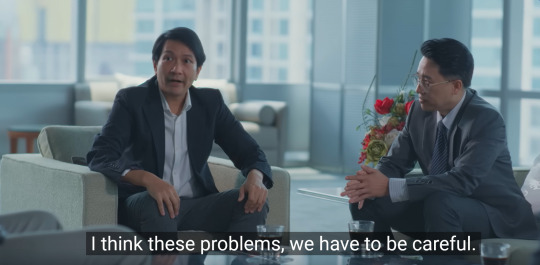
Step by Step has consistently stated that being gay is its biggest problem.
AND I LOVE THAT!
A BL about how being gay is a problem in an industry profiting off of gay stories is what I'm showing up for each week. Mostly when it directly stated that in the series, only to have to be edited due to fan outrage.
Put being an actual gay man in the BL industry is a problem.
Jeng being an actual gay man in a company that made a BL to promote a product is a problem.
Pat being an actual gay man, who successfully marketed a product using the BL concept he was adamantly against yet pulled off with a limited budget and time, rising to a leadership position is a problem.
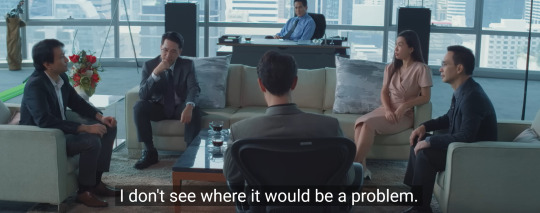
All was fine and dandy when we were watching a BL about two men falling in love and providing each other balance, but the problems started to spring up when the story became about gay men trying to balance their work with their lives.
The pacing fell apart as their work started to take over their lives and everything work related sped up as their personal stories stopped.
The timeline became muffled as life and emotions started to cut into their work. PAT FORGOT HIS OWN BIRTHDAY because time escaped him as we dug further into the corporate world.
The second couple fell apart before they even started as the show began to tell us that life-work integration was never going to work
when
you
are
gay
especially in spaces that want to profit off of the queer community without openly accepting its members in those spaces.
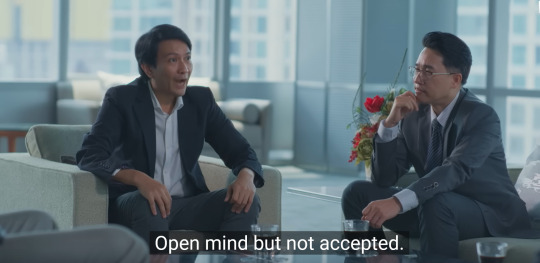
A gay man can't integrate his life into a job that doesn't want to accept that actual gay men exist.
It's performative action at its finest, and it demands that queer people become compliant in their own oppression.
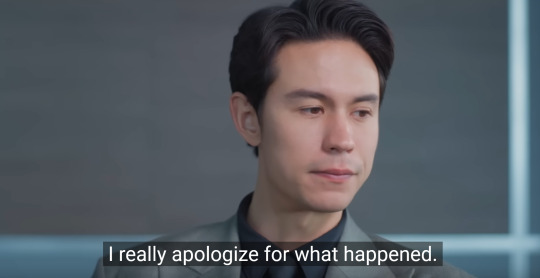
Jeng never caused a problem at work, yet those men sat there and told him their biggest problem with him was that he was gay. Then they made Jeng apologize for it.
Put never caused a problem at work, yet his manager told him that revealing he was in a gay relationship was going to be an issue. Then he pushed Put back in the closet.
Two years ago, both of them sacrificed their relationship and their lives for work, and as result, their entire lives became their work.
They lost track of time. They missed important moments happening in their family and friend's lives. Entire events passed without them being present. They had to compromise themselves to succeed.
And we witnessed that happening to Pat until he realized he didn't want to be manipulated into doubting his skills, his work, or himself.

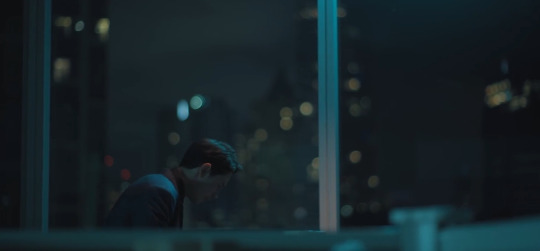
I'm sticking around to see what justice this show brings to its characters who gave up everything just to be left with nothing.
But I stuck around because this show told us from the very first line in the very first scene what it was about.
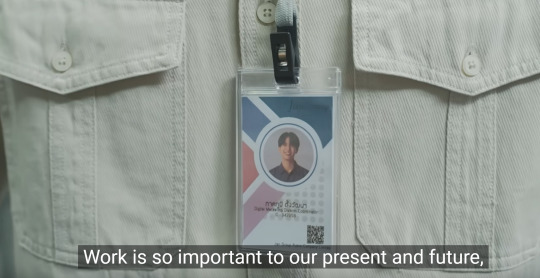
This wasn't a story about falling in love while balancing each other out. This was a story about trying to find a balance between a job that doesn't want to accept your life exists and a life that can't exist because of your job.
One gives you security.
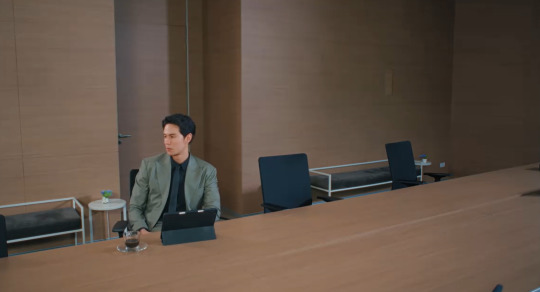
And the other makes you feel safe.
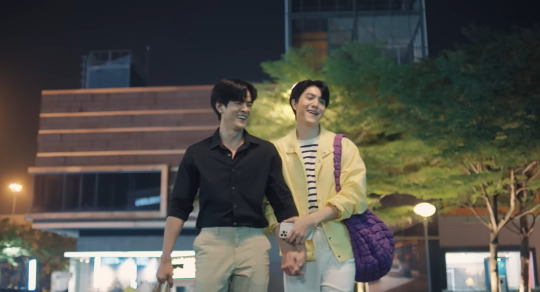
Pat made his choice.
Now it's time for Jeng to make his.

253 notes
·
View notes
Photo


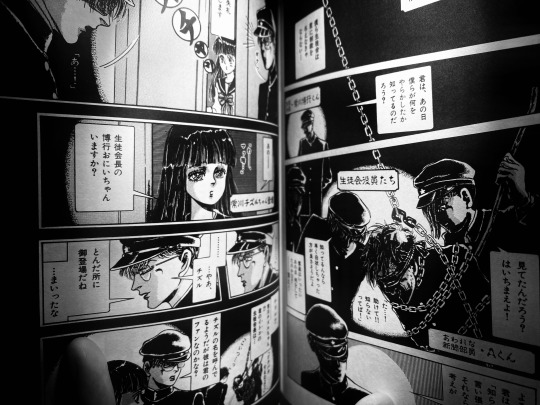
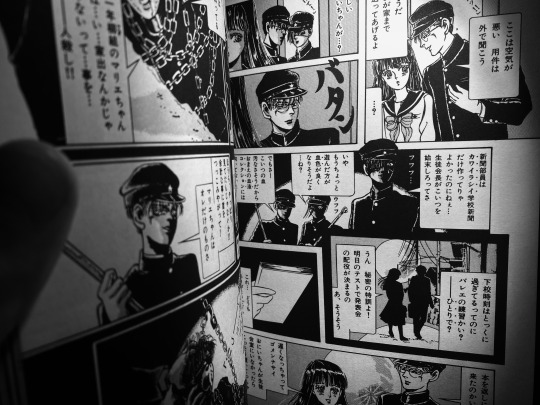


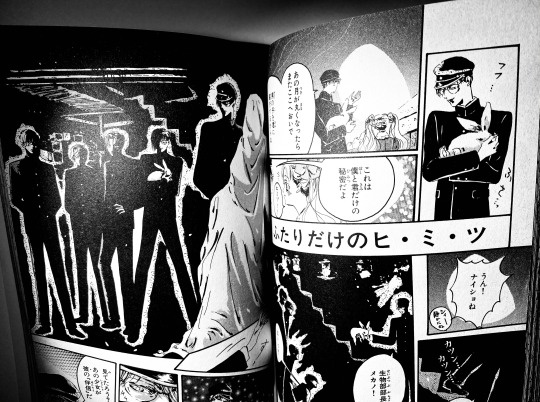

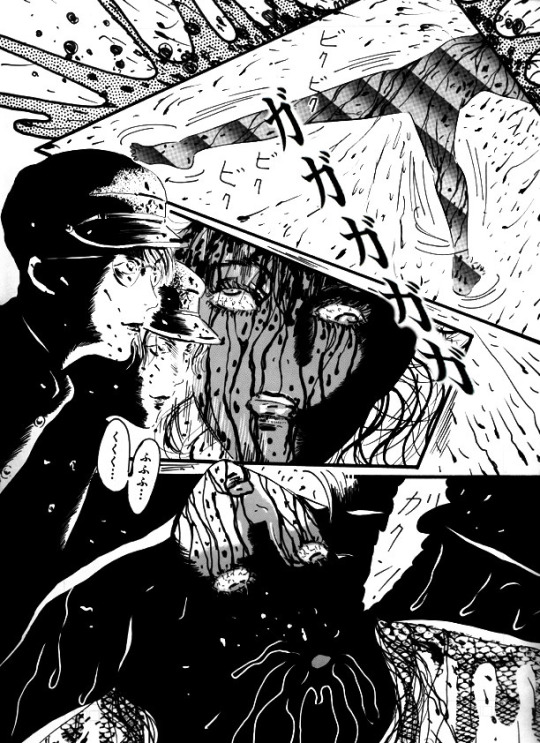
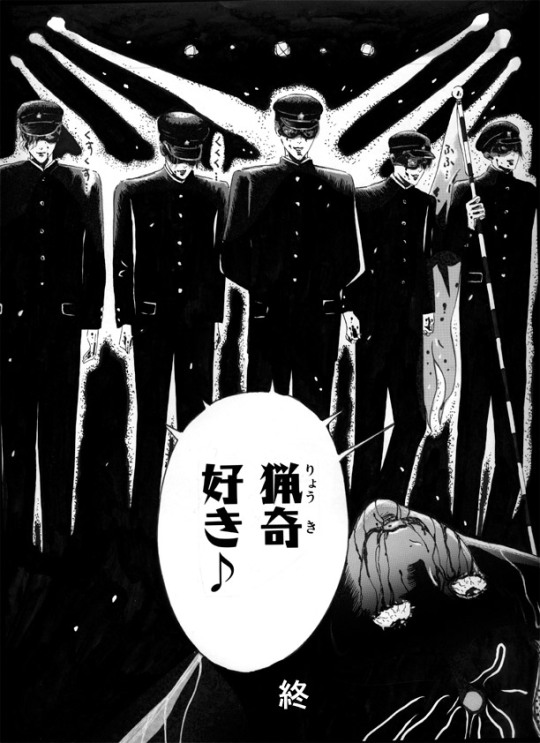
Lychee before Furuya: These images are from the short mangas Das Brute: Blood, Moon Age 15: Damnation, and Jinta ☆ Jinta by pseudonymous manga author Not Osada. Like Furuya, Osada was an audience member for the original Tokyo Grand Guignol underground performances who was left fascinated by the aesthetics and bizarre narratives of their plays. While Furuya’s manga was based more or less on the direct events of the play, in Osada’s short stories a student council reminiscent of the light club are depicted carrying out various atrocities in scenes that mirror the aesthetic fixations of the plays. The short comics in question were published in the anthologies Night Reading Room (1988) and Blind Beast (1996). Moon Age 15 would be most recognizable to fans. In the short story, the club grow concerned about their current hideout (an abandoned industrial shelter that they converted into a space called Eden) after a lonely girl discovers a lab rabbit kept by one of the members outside the space. They eventually lure her into Eden under the pretense of letting her meet her first friend, just to shock her with a grotesque robot made of garbage. They then trap her in the space and burn it to the ground, killing both the girl and the robot in the process. Moonlight lingers as a continual archetype throughout the stories, matching the Tokyo Grand Guignol’s distinctly nocturnal atmosphere. And during the climax of Das Brute: Blood, the student council’s leader (the story’s own stand-in for Zera) refers to the blood of their last victim as being “dirty”, like how the teacher in Mercuro calls Mikami’s blood dirty after killing him in the medical lab at the end of act 2.
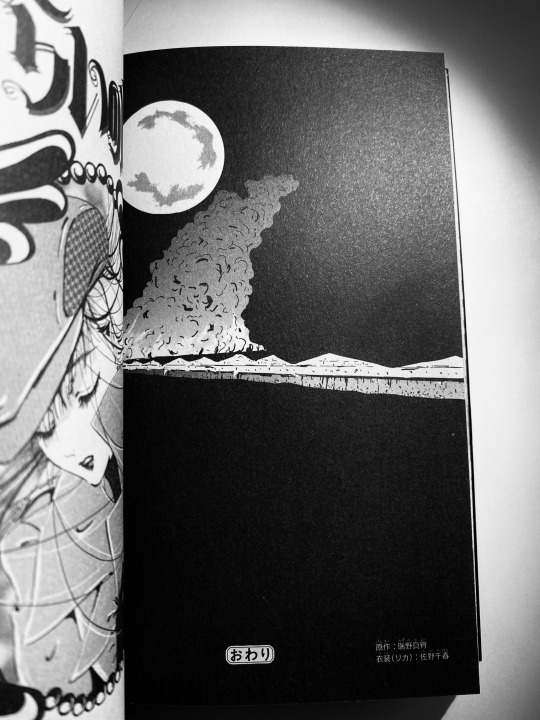
In concern of the mixed relations between later Lychee adaptions and the original Tokyo Grand Guignol affiliates, while many members held complicated feelings towards Furuya’s manga, many speak of Osada’s renditions with an open fondness. Despite Osada having retired from horror manga, he remains a fan of the Tokyo Grand Guignol. On Tsunekawa’s own accounts, Osada was even invited as a cohost for a special Tokyo Grand Guignol memorial event. While I understand the concerns of said affiliates with the increasingly detached and commercial nature of subsequent Lychee spinoffs (with there now being an idol band, comedy anime, etc) I like both Furuya and Osada’s manga works equally as their own interpretations of the TGG’s story. Neither can be direct replacements or likenesses, but instead unique adaptions of a now phantom-like work in how it was known to exist, but can never be directly witnessed in its original form. The screenplay for Lychee Light Club remains unreleased to this day, whilst the screenplays for Mercuro, Galatia Teito Monogatari and Walpurgis were all printed in one way or another in various publications. Osada and Furuya were both authors who were inspired by the underground originality of the production, but Furuya’s was the one that would gain a broader commercial success despite the underground nature of the Tokyo Grand Guignol. It could essentially be read as an ideological complication, with how the theater group was abandoned with the departure of Ameya and K Tagane, what should happen with the legacy of their art? Some fear that the success of Furuya’s manga would ultimately erase Ameya and Tagane’s history. With proper handling though, it could be a gateway into a previously obscure period of underground theater. Original video recordings do exist of several of the Tokyo Grand Guignol’s events, and if published through a public service like Ubuweb (which hosts videos of performances by the Tenjo Sajiki like Directions To Servants, Cloud Cuckooland and The Lemmings), the plays can be assured a lasting cultural legacy in the field of experimental art. In a recent pandemic-era interview, Norimizu Ameya gave his opinions regarding the availability of video recordings of his plays. In the interview, he roughly said the following: “I’ve always believed that there is a finite nature to theater. The fact that it disappears on the spot is the ultimate fate of theater. I have left behind hardly any works from my past. I see myself as a director rather than a playwright, so I have almost no plays. I also feel that many people generally wouldn’t enjoy the videos that do exist as records. I do think however that it’s very important that anyone who is interested in a work can watch it at any time, even if it’s a small number of people. When I was asked to direct Transfer Student, I went to the Wasada Theater Museum to watch a video of the play’s first performance under Oriza Hirata’s direction. I think it’s a good thing that the eyes that have passed through time were able to create a circuit that provides a direct connection to the past. The fact that it’s possible to transcend the finite limit to help others is a testament of humanity.“
152 notes
·
View notes
Note
Hi, I want to work through something because I want to be able to enjoy my time in this fandom and support Harry and Louis as they are now. Unfortunately, I can't help but be incredibly disappointed in the decisions that HL have made. Let me preface this by saying that I am aware of how entitled and selfish I sound but emotions sometimes override logic.
I had really big and unfair expectations of Harry and Louis. I honestly thought after One Direction they would come out and start their solo careers on an authentic and free foundation. They had the potential to be such an inspiring and important power couple in the industry and society in general. I pictured them being an amazing source of representation, attending charity events and talking about important issues. All the while staying intensely private. It's this wasted potential that I really struggle to accept. I also have a sneaking suspicion that the Harry and Louis from 2014/15 would be a bit disappointed in where they are now, not on the career front but having a fake son and still kissing supermodels.
As someone who doesn't place a great deal of value on things like career and ambition it's disappointed me how they've chosen that above all else. I believe there are more important things in life. Again, I know how all this sounds but no matter how hard I try I can't help how I feel. But I want to change because I want to be able to enjoy the people that HL are now. It's hard because I'm not here for their careers I'm here for them purely as people and as a couple.
Hi! So first, I’d like to say that I really appreciate the openness of your tone, even though we have quite different opinions. I’m going to strive to match that openness in my response, and if I fall short, I apologize in advance. It’s not at all my intention to come off as rude or aggressive, I just want to challenge your way of thinking about activism, authenticity, and the roles their careers play in that.
You say you’re not here for their careers. You’re here for them as people and as a couple. You don’t seem to see those two are directly interlinked.
The only reason we have access to them as people/as a couple, is because they both chose to continue their careers in the public. They both could have easily chosen to take a step back and work in the background (music production, management, etc.), which would mean no drama. Maybe would’ve meant a bigger chance for them to come out publicly.
But that would have also meant no content. No music, no pap pics, no articles (barring maybe one or two about a charity event, if what you imagined came true). That means no safe spaces at their concerts. No flag waving. No speeches about acceptance, and I need you, you need me, about your body, your choice, about helping people come out… No lyrics about all this time, and we could be lucky again, and you can throw a party full of everyone you know, and we’ll be alright…
No input, no… personality. So who would you be loving? Who would you be here for, exactly? Who would you be supporting? A snapshot of who they were as people/as a couple? The idealized fantasy of a power couple? The people you remember they were seven years ago?
Related to that, I understand that explicit activism is important to you. I understand that you understand that you’ve placed a lot of expectations on them that aren’t fair. Why you’ve done that could be for many reasons — maybe that’s how you personally choose to connect with the queer community, maybe you feel like if you had their platform and their resources, that’s what you would do, I don’t know.
But everything you’ve mentioned (“…come out and start their solo careers on an authentic and free foundation. They had the potential to be such an inspiring and important power couple in the industry and society in general. I pictured them being an amazing source of representation, attending charity events and talking about important issues…”)
Well… who’s to say this isn’t “authentically” who they are (while still working to preserve other things that are important to them, like the privacy of their relationship and their opportunity to make art), even without being “out” and “out together”? Who’s to say they aren’t currently an amazing source of representation? Who’s to say they aren’t talking about important issues?
Because, to me, they are. They may not be doing it at the helm of a pride parade in a rainbow mankini making out in front of news cameras.
But isn’t it equally as important to hold spaces for queer people to just gather and experience joy? Isn’t it equally as important to be verbal about challenging adversity and coming out on top? Isn’t it equally as important to make coming out to one’s parents a communal, celebratory fantastic memory instead of something that’s solitary and filled with fear? Isn’t equally important to prop up young musicians and show them someone with power will be kind, will be supportive, will open doors for them?
There’s value in pragmatic, maybe even implicit, forms of “activism”, too. There’s value in championing life and love and kindness and joy and upholding it for the people who can’t uphold it for themselves. (And it’s especially meaningful coming from two people in such a historically abusive, conservative, homophobic industry.) There’s value in using your time in the spotlight for the benefit of your actual fans.
TL;DR I guess what I’m saying is, we all seem to uphold this gold standard of activism to the letter, and assume that anything less than that isn’t activism, isn’t authenticity, isn’t representation. But having such a rigid definition of “doing good” for a community negates the constant and consistent representation and good they’ve both fought to be able to do.
You said a lot more in your anon, but this is really all I have energy to answer. If it doesn’t change your mind, that’s okay. If it’s still not enough for you, that’s okay too. It doesn’t, and won’t ever, negate everything they’ve done for me and for others.
Maybe one day you’ll find your way back, or maybe you’ll find a couple that represents you the way you need to be represented. Until then, all the best. 🤍
153 notes
·
View notes
Text
I listened to the All Access Trek Podcast. Laurie Ulster said something that piqued my curiosity. Laurie mentioned that the writers of season 5 of Discovery want to be more connected to the larger Trek universe.
Then, Laurie and Anthony Pascal noted how different this attitude was from the early seasons of Discovery. Both Laurie and Anthony were involved in and around Trek productions, and Laurie herself was a host of After Trek (back when it existed).
Laurie mentioned that in season 1 of Discovery, studio executives would freak out if other Trek properties (specifically 90s Trek) were mentioned or alluded to. The TOS era is allowed, but it seems anything related to 90s-era Trek was not allowed.
And, it’s all because Star Trek Nemesis flopped big time.
(According to Jonathan Frakes he was told that Nemesis was the one that actually lost money.)
The effects of Star Trek Nemesis’s flop were so wide-ranging it almost killed the franchise. A few years later, they canceled Enterprise and any upcoming Trek live-action projects.
Nemesis is to blame for why neither Deep Space Nine nor Voyager had a live-action movie.
According to BTS reports and what the TNG actors have mentioned, Nemesis was a troubled production from the start. It got worse when the director, Stuart Baird, didn’t even care to know the actors’ names (famously mispronouncing LeVar Burton’s name). Additionally, he never bothered to watch a single episode of TNG. Marina Sirtis and LeVar Burton have been outspoken about how much they dislike Nemesis and the director (more from Marina on this).
(Both Marina and Gates McFadden weren’t fond of the other TNG era movies either, especially Gates because she was little more than a cameo in the movies.)
After Nemesis flopped it took years for Star Trek to return, and after that, there seemed to be a mandate from the studio to never mention 90s Trek.
This is why Star Trek: Picard was such a big deal, especially since it directly references events from Nemesis.
(And, an even bigger deal for Picard Season 3 reunion getting produced.)
The Nemesis effect continues to have an impact on the movie side of the franchise. The majority of announced projects take place in the pre-TOS era, TOS era, or the Kelvin timeline but there are no projects set during or after the 90s-era Trek.
This is why mentioning a ship class called Janeway was big but even bigger, showing Picard and directly referencing to the Dominion War and Deep Space Nine and Discovery is a big deal.
Anyway, I just wanted to mention all this because it baffled me why the executives were so into TOS-era trek and there seemed to be no interest for 90s-era Trek. And, learning about all this finally answered all my questions.
TLDR, I like TOS era but I’m not into the TOS-era and I enjoy the Kelvin timeline as much as anyone else but it is not the era of Trek I’m interested in. So the movies set all TOS or Pre-TOS era— its just not something I’m going to jump around about.
22 notes
·
View notes
Text
What the hell happened with Crow: an autopsy (Part 2)
Hope you didn't think I'd forgotten about this post yet. Lads, ladies, and other lovely people, here we go. I have more yelling about bird boy to do.
But first, a few disclaimers. For people who may have missed part one, yes, as the title implies, this post is part two of an attempt to analyse Crow's character throughout 5Ds' whole run. You can find part one here. Now, both for people who may not have the time/energy to read my first, huge post about this right now, let me explain what I'm about here before we start again: My analysis is not meant to deter people who like Crow from liking him. It's also not meant to convince Crow haters otherwise, even if I admittedly personally like Crow. All of this stuff is just my personal attempt at dissecting how his character was handled in the show and why that might have been. And because this is part two, and I covered the Fortune Cup and Dark Signers arc in the first post, I'll start with the pre-WRGP arc, then dig into the backstory Crow was given directly before the WRGP begins properly. Also, mind the length of this post. I'm physically incapable of writing short things.
I also feel the need to reiterate another thing before I really get into the meat of things again: If you were hoping to see any old rumours about 5Ds confirmed, this is the wrong post. In fact, thanks to the very thorough work of someone over on Reddit (another shoutout to @mbg159 here, who's the author of those posts), I know for a fact that literally all the big rumours surrounding Crow are one big pile of logistically impossible horseshit, and I think after so, so many years of people citing this nonsense, the fandom as a whole finally deserves to let these go:
No, Crow was not meant to be a dark signer, least of all the final boss of season one, and Blackwings were not the reason he got more screentime later.
No, Aki being sidelined was not the result of her irl voice actress' pregnancy.
Yes, I know these two posts are both a long read each, but I cannot begin to tell you how tired I am of these rumours. So even if you don't have time to read the stuff above, please take away this: The big 5Ds production conspiracy theories are. all. bullshit. Because, to put it in as simple terms as possible, none of them work out logistically. The events people have pretended affected the show's production in a major way all don't line up with the actual production timeline. So just can the rumours already. Please let them die. And no pitting Aki and Crow against each other on his post or because of this post, yes? I beg you, I am so tired. Ok? Ok.
All right, now we can get to the good part. In my previous post, I left off at the end of the DS arc. So, in what position is Crow at the end of the DS arc? He helped save the world by defeating Goodwin and got his very own signer mark after Rudger/Roman Goodwin's death.
And now, where is Crow at the start of the pre-WRGP arc?
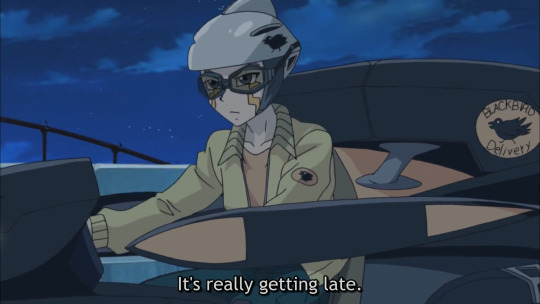
(Bam. Delivery bird boy be upon ye.)
This time, Crow wastes absolutely no time coming back on screen. We see him again within the first episode of the second half of the show, and wouldn't you know it! He moved in with Yusei and Jack and the three of them have a funny, brotherly, bickering dynamic between them. Also, as a fun little add-on that is very much in line with his deeply Satellite, down to earth characterisation from the first half, Crow now works as a delivery driver to earn money for the household. That's all very nice and good.
But what is his role in the plot from here on out? Well.
First, a small note about the pre-WRGP arc. Though this arc is fun to watch because it gives us a lot of silly character interactions the show no longer found the time for once the WRGP started, the pre-WRGP arc really can't be said to bother with actual plot much. It's the known filler arc of 5Ds, and as such, Crow is not the only character who gets pretty much nothing plot-related to do during this arc. Thus, I'll only give a quick run-down of what he does get up to, just in case any of these tidbits end up showcasing a relevant aspect of Crow's character I might come back to later.
Furthermore, another thing that's pretty much obvious to everyone who's ever watched the show in its entirety but still bears mentioning: Crow gets a lot more screentime from this point on out. Technically. Why do I say "technically"? I'll get back to that further below. For now, just keep it in mind.
So, how does Bird Boy spend his time during the arc where the plot's on the back burner? To be honest, on the sidelines, mostly. Don't get me wrong, Crow's there. Most of the time. But he gets pretty much only two episodes where he's the focus, and both of those aren't exactly known for being 5Ds' most memorable episodes (even though I still like them both tbh, but I digress): For one, in episode 68, he gets to convince Bashford to move in with Martha so the depressed old man isn't spending his entire retirement living in a scrapyard.

(This episode's comedic moments are actually fairly solid. But those are just my two cents.)
And for two, in episode 85, Crow gets to bond with the boys' somewhat cranky landlady, Zora, by duelling some sense into her son, Lyndon. (Which also introduces us to a duelling tactic only Crow uses that we will later see again: Losing on purpose.)
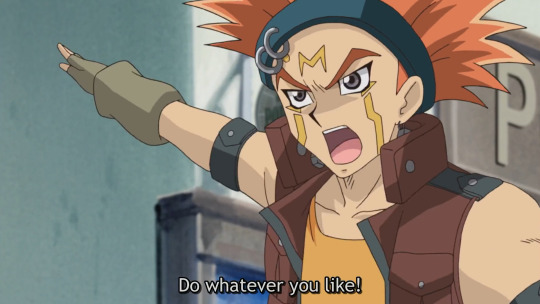
(And here we can see Crow showing off his skills at dealing with petulant children.)
Now, do these two episodes where he gets to be relevant actually do anything for Crow? As a character? Debatable. If nothing else, they strongly reaffirm the values Crow represents which we were introduced to in the first half of the show, though. They reintroduce us to his stubbornness, to his (in comparison to Jack and Yusei) more playful nature, to his very Yusei-ish dedication to doing the right thing, to his penchant for spite, and to his strong sense of family and community and his belief that these two things shouldn't be abandoned unless you have a damned good reason for it.
You may notice that there's a sizeable gap between these two episodes. That's because those episodes are where we get the only smidgens of plot in this arc. Among them, highlights like Sherry's introduction, the first reveal of accel synchro, Aki's turbo duelling license exam, three separate story beats hinting at the machinations of the emperors of Iliaster (Luciano's little stunt with Rua and Ruka, Placido getting started on building a killer robot army, and the Jack double being unleashed onto NDC), and Bruno's introduction. So, here's the thing: Crow is technically present during most of those episodes, too, but he doesn't actually get to meaningfully interact with the plot-relevant elements. (Which is not to say he doesn't have nice moments here and there. He does get to bounce off the other characters, and, just as one example, helps Yusei and Jack upgrade Aki's duel runner, as well as help Yusei build Rua's duel board. Crucially, he doesn't get to do anything that later becomes plot-relevant, though.) Moreover, not one, but two characters who end up becoming major players in the series' finale are introduced here, which is relevant insofar as that Bruno and Sherry both end up needing a good amount of development before they can impactfully take their later roles. Now, I say this with nothing but genuine appreciation for both these characters, because I do like them, but I feel the need to point out what this means not just for Crow, but for pretty much everyone who isn't Jack or Yusei: Every minute of screentime that was dedicated to Bruno and/or Sherry was one minute less the writers could spend on the rest of the cast. This is not to say that time shouldn't have been spent on them, they needed it, especially because they were introduced so late, but it's something I do want people to keep in mind when talking about who got how much screentime and whether or not that time was well spent. (I also have a larger gripe with the definition of "screentime" in general, but more on that later.)
So when does Crow get to be relevant to the plot again, now that he's even a signer and all? Well, not until episode 94, when the WRGP arc has already started. (Note that I'm using the 5Ds episode list on wikipedia as a general guide for which arc and which season starts where. You can find it here.)
*Deep breath*
So. Episode 94.
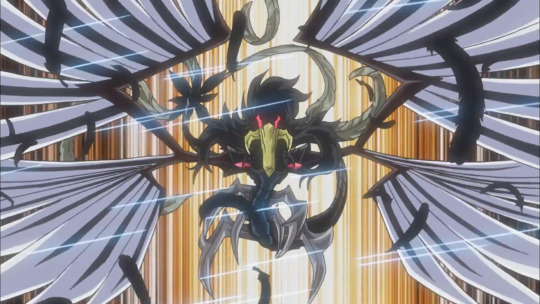
(Pictured: One very scruffy dragon. Bird? Dragon-bird. Bird-dragon. You figure this shit out.)
That episode. The episode where Crow, who was awarded with the status of a signer during the finale of the DS arc, finally gets a dragon to match his mark. And the episode where we finally, finally, get some actual backstory for Crow that goes beyond his involvement with the Enforcers and childhood with Jack and Yusei. A backstory that's only Crow's own. Except. How do I put this politely...
This shit doesn't make a lick of sense. Neither the events in the duel between Crow and Bolger in the present resulting in Black-Winged Dragon's appearance, nor the Pearson backstory.
Now, I'm not saying this to step on anyone's toes. From a writing standpoint, I can even make a fairly reasonable guess as to why this episode/mini-arc is here, I think: As I mentioned in part one of this analysis, Crow was not only introduced very late, but also got very little backstory of his own, which set him apart from the other signers. Don't get me wrong, he did get some backstory—we know of his strong connection to Duel Monsters because he learned to read from cards, and we know of his involvement with the Enforcers/Team Satisfaction. Crucially, though, Crow doesn't really get a backstory segment that feels as unique to him as the others. Aki gets her tragic past with her parents and her powers, Jack gets his betrayal of Yusei, which also doubles as part of Yusei's backstory, who as the protagonist understandably gets the most backstory, and even the twins, though they are as always treated as one unit, get their very own segment about the time when Ruka was essentially in a coma. Meanwhile, Crow only has that one-off tear-jerker moment about learning to read from his cards and his being a part of the boys' duel gang, which, and I cannot stress this enough, is treated as more of a Yusei and Kalin/Kiryu backstory by canon than a Crow backstory. Thus, it makes perfect sense from a writing standpoint that the Pearson/Black-Winged Dragon mini-arc would be here. Crow, up until this point, has neither a backstory segment dedicated solely to him, nor a signer dragon to call his own. So, how do we solve this? Give him both in a strategic double-whammy! The math checks out. Unfortunately, the writing of said mini-arc... doesn't.
Now, look. The juicy question of whether Crow would have worked better as a non-signer or not, which I already discussed in part one aside, I personally don't hate what this backstory is trying to do. It's just that the whole Pearson-drama has some very notable, logical holes which I'll get into below. Furthermore, this is not the first time something related to Crow has some unfortunate, logical and/or chronological issues. I already brought up the infamous fridge and Rex Goodwin's rather confusing backstory in part one, both of which raise some serious questions. However, Pearson and everything surrounding him arguably blow that clean out of the water. Let's examine this more closely, shall we.
The long-overdue backstory we get for Crow begins with a mystery: Mikage and Trudge, for a reason that is never given to us, are investigating the death of Robert Pearson (whose death would have been several years ago at this point), whom Crow knew very well, and they're doing it because they found a hint that the person who killed Pearson used an illegal card, Crimson Mefist, to do it.
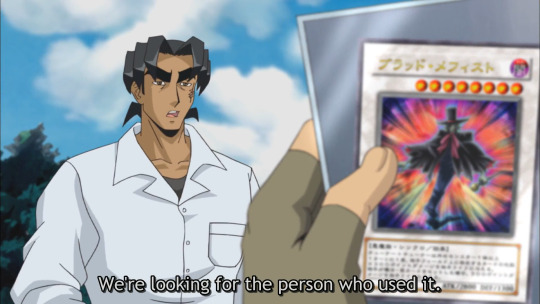
(Post redemption-arc Trudge actually doing his job instead of bullying random Satellite citizens. Who would have thunk.)
Thing is, here, we already encounter our first, minor problem: Pearson has never been mentioned up until this point, not even as an aside. And this issue is compounded by the fact that not only Crow seems to know him, but Trudge claims to as well, because "Satellite used to be his jurisdiction". So, a named character who's familiar to both one of our protagonists and a notable side character, and we've never seen hide nor hair of him. If we pull our heads out of the story for a second, the irl reason for how this came to be is probably pretty obvious: Pearson was never mentioned before because the writers had nowhere near as solid of a plan for Crow as they did for the other characters, which leads to him being introduced out of nowhere here because we need a backstory and a dragon for Crow and we need those now. Moving on.
The mention of Pearson having been not simply killed in a fire, like Crow previously assumed, but having been murdered through a special, illegal card immediately makes him suspicious. So, he goes to consult Bolger/Bolton, another never-before-seen character who gets introduced in service of this backstory, and who knew Pearson well. And while this guy certainly acts amiable towards Crow at first, implying that the two have a good rapport, at least, he quickly starts acting suspicious when Pearson's murder comes up. Moreover, we as the audience at this point already know Bolger's looking for Black-Winged Dragon so he can use the card essentially as collateral to save his company. And the name "Black-Winged Dragon" already leaves very little to the imagination as to whose deck this monster is supposed to fit into. But, in a small twist, we learn from Crow that this was apparently Pearson's card, and supposedly lost in the fire where said man died, to boot. Then Bolger challenges Crow to a duel, too, offering to tell the truth about Pearson's death if he loses, but demanding Black-Winged Dragon, which he believes Crow to be in possession of, if he wins. So far, so good. We've got a mystery here, and canon is not contradicting itself just yet. Until we get to the actual backstory, which shows us the time Crow spent with Pearson, that is. Before we get into that, I'd like to highlight one theme this mini-arc introduces that actually feels like it fits Crow: Legacy. Over the course of meeting Bolger again and being reminded of his time with Pearson, Crow starts thinking about whether he's taking over his former mentor's/father figure's legacy well enough.
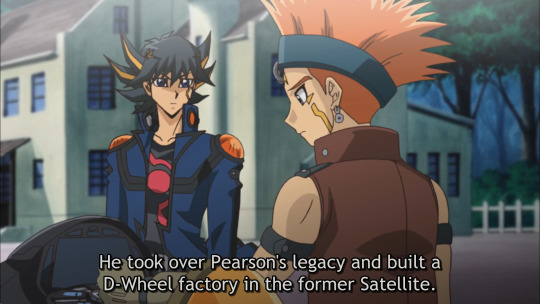
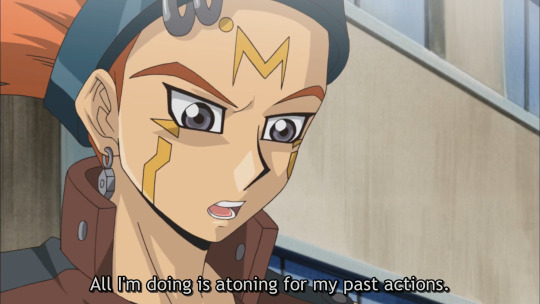


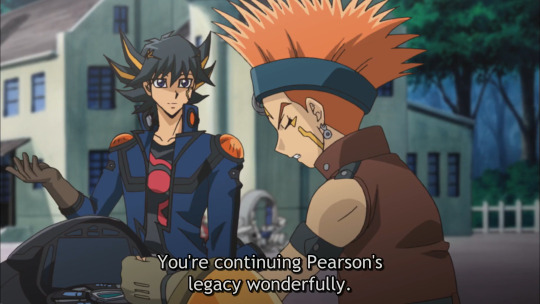
(Crow having some Deep Thoughts TM, featuring one of Yusei's most relaxed, easygoing smiles in the entire show, probably.)
This theme, I would argue, is one of the major things this backstory introduces that really meshes well with the Crow we already had until this point. He's a community-focussed guy and absolutely a family person, if him taking care of Satellite orphans is anything to go by, so leaving behind a good legacy for the people after him (read: the kids he took care of) would absolutely be something he cares about. We see this element of legacy again in his cards during this episode, too, which canon implies he inherited from Pearson. (I'll get to THAT can of worms below.) And on paper, with the themes he's already got going, Crow being the only one to inherit his deck rather than build it all by himself would actually make sense!
However. This is where we have to get into the meat of the backstory. I'll start by listing the barebones information Crow's backstory with Pearson gives us, then going into why several aspects of it are either logistical or chronological nonsense.
So, as canon tells us, Crow met Pearson after Kiryu/Kalin was arrested, when the Enforcers/Team Satisfaction all went their separate ways. During this period, Crow had already set up shop near the original Daedalus Bridge and started out taking care of orphans, but it wasn't all smooth sailing. He was, by his own admission, "living aimlessly". Then, during a pinch, Pearson and Bolger show up, take care of some bad guys for Crow and the kids, and Crow sees a new role model in Pearson. Pearson, who rides the Blackbird, plays a Blackwing deck and owns Black-Winged Dragon. So, he joins up with Pearson, presumably learns how to work on duel runners from him, and also befriends Bolger. Then, one day, a fire breaks out at Pearson's workshop and the man in question dies, but leaves Crow his runner and his duel disk before he does so. End flashback. Because I want to tie this together nicely, we also learn later that Pearson technically left him Black-Winged Dragon, too, by sealing it in his runner. And, of course, that dragon later becomes Crow's very own signer dragon.
Several points to be dissected here. And funnily enough, Bolger's duel with Crow isn't relevant for any of them. Let's start with the big one: The timeline. I want you to remember that as far as canon is concerned, Crow is 17 during the DS arc. Moreover, it's canonically stated that Jack stole Yusei's first duel runner two years before the show's start, at which time Crow would have been 15. And their time together as the Enforcers must have been even before that, because Kiryu/Kalin was already in prison for a while at that point and Crow and Yusei don't reunite until the DS arc is basically in full swing. So, I'll make a vague estimate here and say that during the time of the Enforcers, Crow would have probably been 13-14. (Which is hilarious when you think about the fact that this gang of angry teenagers essentially took over the entire duelling underground of Satellite, but I digress.) Now we add the idea that Crow met Pearson after the Enforcers, but that he died before canon starts into the mix. That means Crow first ran into Pearson sometime around age 15, and that he then died presumably before Crow turned 17. So far, so good, that still slots into canon, even if it makes Crow pretty damn young for some things. He's even missing the personalised Blackbird duel disk he later wears during the Enforcer days, I went back to check. What he is not missing, however, are his Blackwings. And this is where canon may or may not have made an implication that, if intentional, breaks this timeline. See, during the scene where Pearson's workshop is burning down and he's already trapped under debris and has embraced death, he tosses Crow his duel disk and leaves him his runner.
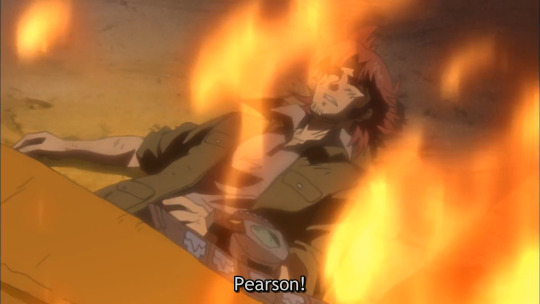
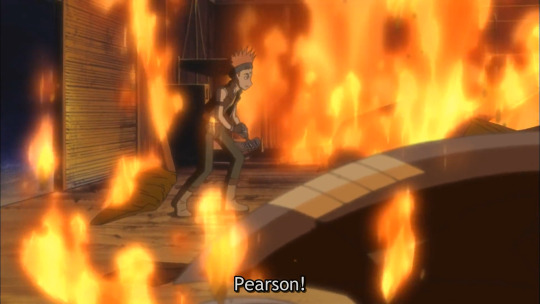
(Two important screenshots, in sequence. One, Pearson with his duel disk still strapped to his arm. His deck is very obviously still in there. Two, Crow with that same duel disk, as made obvious by its distinct shape.)
What this implies is that Pearson also left Crow his deck. Which, yeah, fair enough, if I were dying in a fire I'd probably also think "fuck it, not like I'll need my cards in the afterlife". What this (and Crow's look the first time he sees Pearson's monsters) implies, though, is that Crow didn't start playing Blackwings until Pearson left him his deck. Which is factually untrue, because there is literal evidence in the show that Crow already had Blackwings during his time as part of the duel gang, before ever meeting Pearson. (The exact episode, if you want to check for yourself, is 33, where Crow summons both Bora the Spear and Blackwing Armor Master during a flashback.) However, I will concede that the show never actually states this is the case, it's just implied by what we see on screen, so perhaps the idea here was that Crow already played Blackwings before Pearson, but grew to love them even more through his mentor/father figure, and so later happily integrated the deck he inherited into his own. Crucially, canon never states this outright, either, though, so the option remains on the table. But, to give the benefit of the doubt here, the possibility that this could still slot in with canon and that it was just handled poorly is there. The same cannot be said for the Blackbird, however.
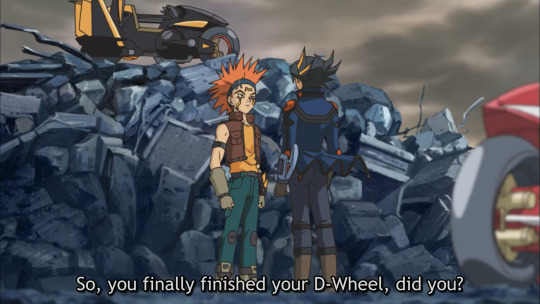

(Uh oh. So much for canon continuity.)
The above two screenshots directly contradict each other. First we have Yusei, upon reuniting with Crow in Satellite during the DS arc, casually remarking that Crow finished his duel runner. Which means that canon at this point suggests to the audience that one, Crow built this duel runner by himself, for himself, and two, that Yusei knew about it for a while already. Then there's the second screenshot, from the Pearson backstory episode, where Crow outright claims the Blackbird was left to him when Pearson died. I don't think I need to tell anyone that these two things can't be true at the same time. And again, I think this is where Crow fell victim to the writers not having a clear outline for him. At first, he was supposed to be this scrappy guy who also built a duel runner for himself, just like Yusei. But now, he's a signer, needs a backstory and a dragon, and because a theme of legacy is introduced alongside Pearson, the runner suddenly needs to be inherited, as well as (possibly) Crow's cards. Now, a crafty fanfic writer could probably reconcile the above contradiction somehow, and I know some stories that accomplished that. But the point isn't that we, as the audience/fandom could make this work, the point is that canon didn't make it work. What canon, sadly, also didn't get to work was Black-Winged Dragon.
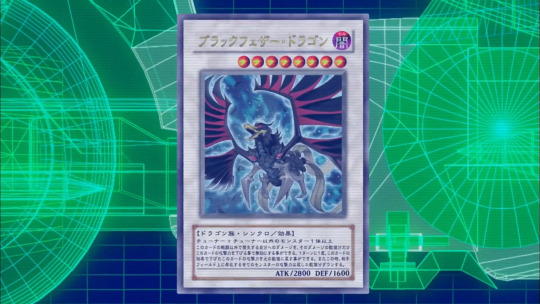
(We meet again, bird-dragon.)
Here comes the next elephant in the room: Everyone and their mother who has watched 5Ds knows that Black-Winged Dragon was never implied to be a signer dragon up until the duel where Crow acquires it. In fact, an entirely different dragon is teased so heavily long before BWD ever shows up that it to this day is one of many people's major gripes with the show's writing.
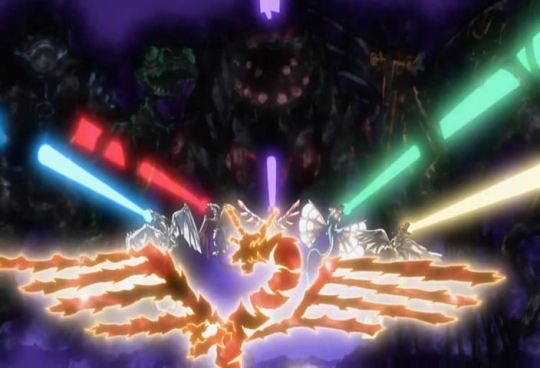
(Why, hello, Life Stream Dragon! Fancy seeing you here.)
And yet, Black-Winged Dragon is turned into a signer dragon before Life Stream Dragon, who was teased more than sixty (!!!) episodes before BWD was ever even mentioned. Why? Simple: Because Crow became a signer and Rua/Leo didn't, because the signers all need dragons (or else the "5Ds" part kind of doesn't work), and because Life Stream Dragon thematically doesn't fit Crow.
Now, I've seen people post theories to reconcile this weird hitch in canon, hell, I've even posted an idea for how it could be reconciled myself. But, again, that isn't the point here. The point is that as far as good old, barebones canon is concerned, it isn't reconciled. Canon at first states there are five signers, suggesting that there are also five dragons. But then, the fifth dragon never shows up, and one of the signers dies, to boot. Only for canon to then teach us, oh, no, look, the signer marks can wander from one person to the next. And to add insult to injury (at least where the show's writing and internal consistency is concerned), the signer mark that was "freed up" by Roman/Rudger's death doesn't wander to Rua/Leo, who any attentive watcher would have expected to become a signer because it was heavily teased during the DS arc, but to Crow. Frankly, I'm not surprised many people were angry about this, but in case my disclaimer didn't make it clear, I don't think it's productive to pin this on Crow by claiming his cards became super popular irl. There was definitely an out-of-left-field writing choice made here, but the only answers as to "why" were left in the 5Ds' writer's room, I believe. At a guess, if you want me to throw out a non-sugarcoated theory as to why, though? They probably thought Crow would be a more interesting character for their target audience. He's a scrappy guy who sticks it to authority, he's brave, he's funny, he plays a cool deck, and most of all, unlike Rua, he never embarrasses himself in a duel on screen. Why am I highlighting that last part? Because I feel like people sometimes forget that the target audience for this show, at the time of its creation, were about twelve year-old boys. And you can feel free to contradict me on this, but most twelve year-old boys I've known and know don't want to project themselves onto a chracter who loses and gets his butt kicked a lot, and who's a bit awkward and steps in it sometimes, which is much closer to how actual twelve year-olds are—but that's exactly why they prefer the cooler characters. And Crow is the cooler character, by average twelve year-old boy logic, regardless of what the grownups of this fandom think.
So Crow gets a dragon and the writing doesn't bother explaining the how or why of it, let alone tackles any of the implications made by Black-Winged Dragon's existence as a signer dragon. (Like what does this mean for the larger worldbuilding? Does the Crimson Dragon actually have more than five servants, but chooses to only ever bestow five marks at a time? Can any "dragon" the Crimson Dragon chooses be a signer dragon, and it just so happens that the constellation of signer dragons is nearly the same as the original one in present-time 5Ds canon? Did the Crimson Dragon specifically elevate BWD to a signer dragon because it felt like it? Was BWD always supposed to be a signer dragon? Was Pearson supposed to be a signer, but died too early before the dark signer prophecy was set into motion? Am I overthinking this? (Yes.)) He also obtains his dragon in what feels like the weirdest way possible to me, because it suddenly??? Just decides to appear in his runner????? Out of nowhere??????

(Why is that here. How did it get there. Why did Pearson even put it in there. And HOW. Is it just wedged between the machinery or what???? And how on earth did Yusei, Bruno, and/or Crow never find it before this point considering how often someone tinkered on the Blackbird on screen???)
(This scenario, of course, also raises the question how the other signers even got their dragons. But like many other, interesting questions, this episode chooses not to interact with that one whatsoever.)
In short, this backstory is a bit of a mess, to say the least. For as much good as it tries to do by contextualising Crow's character and giving him something that sets him apart from the rest of the protag group, it feels like a rough draft of an episode was given the green light to be produced without any editing, judging by the contradictions and weird implications. As such, it harms Crow's character as much as it builds it, as evidenced by how much fandom backlash he still receives years later for the things that were bungled in this backstory and also in different aspects of his character writing.
Now, you may notice this post has gotten stupidly long due to just how convoluted the specific hangups of Crow's backstory are. I originally meant to cover the WRGP and even the Ark Cradle arc for Crow in this post, too, but due to how much there was to say about canon's attempt to finally make Crow a "proper" signer, I've decided that trying to force another two whole arcs in here would be a disservice to the analysis and the character, and also make this agonisingly long, so I'll close this part out here and write a part three, perhaps even a part four depending on how much material the WRGP gives me to work with.
There's one more thing I need to get back to before I finish up this part, though: The "screentime" discussion. I mentioned far above that I take issue with how some people seem to be using the word screentime, and now I can explain why. First, I want you to take a look back at the episodes I covered here, those being 65-95, essentially. Now, as anyone who usually dislikes Crow will tell you, Crow is present in most, if not all of these episodes. He's on screen. He's getting screentime, and, according to many people, hogging it, even. Okay. Now, I want you to look back up at the analysis. How many episodes did I cover where Crow actually gets something to do? As in, where he's either the focus of the plot or gets to contribute to it in a significant way? There's the old man Bashford episode. There's the Poppo Time clock episode. There's his two backstory episodes. That's four. Four episodes. If you're generous, you might add in the episode where he gets to narrate Yusei's backstory alongside Jack and the two fake Jack episodes where he gets to have an emotional moment or two with his foster-brother. If you're less generous, you'll note that none of these episodes have Crow actually interacting with the main antagonists in a meaningful way or set up anything important that pays off later. (Hell, he doesn't even get any, and I really mean, any meaningful setup interactions with Sherry, who ends up being his final-boss-level opponent during the final episodes! Aki gets more meaningful interactions with Sherry than him, not that this ever gets a payoff.) And this is why I take an issue with people claiming Crow gets so much "screentime" post DS arc. Because to me, "screentime" should be time spent letting a character act meaningfully within the story, which most of the pre-WRGP episodes aren't for Crow. He's on screen, yes, but in many episodes, it wouldn't matter one whit whether you replaced him with a nameless side character, which isn't exactly a great look for a supposed third of a protagonist trifecta. Perhaps I'm being too strict with my definition of "screentime" here, fair enough! But the claim that Crow hogs screentime already rubs the wrong way during this comparably unimportant arc, so I can't leave it alone. It feels very decidedly malicious to claim a character who during some episodes seems to only be there to provide exposition or make whatever jokes Yusei and Jack's personalities aren't suited to is stealing screentime from other characters. As for the WRGP duels and whether he's "hogging" anyone's screentime there, I'll dig into that nonsense in the next part, please be patient with me.
...Phew. Okay.
Now, before I leave you to wonder whether I'm every finishing my Crow analysis in full again, I want to attempt to do the same thing I did in part one—propose some changes that could have been made to the writing for Crow's character in order to make things slot in better with the rest of canon. With a small disclaimer, of course: These are just my suggestions as to how Crow's character could have fit into canon more smoothly and been done less of a disservice by his own backstory.
So. First, a quick-fire thing about the pre-WRGP, to get that out of the way: Crow, alongside Aki, is the only signer who didn't get his own confrontation with either Iliaster or their minions. (Yusei had Ghost, Jack had fake Jack, Rua and Ruka had Luciano.) Instead of having him confront a cranky old man in a scrapyard or Zora's son, they could have easily given him a very short side-story where he gets to experience the threat of Iliaster up close and personal, too. Hell, they could have very nicely cut the recap episode where Crow and Jack lie in the mess of Jack's terribly built coffee table and philosophise about Yusei's backstory for this, too. (As funny as their interaction about the coffee table and Jack lying on the floor with a perfectly intact coffee cup are.)

(Pictured: Two idiots (affectionate) contemplating life among the scraps of a shitty, broken coffee table.)
Then, there's the Pearson backstory, of course. So, here's the thing, I think two very different kinds of "fixes" could have worked here. Crucially, they both depend on Crow's status as a signer. I argued in part one that Crow might have worked better as a character if he hadn't actually become a signer, so I'll give both versions here. Let's go.
Option A: We try not to touch canon too much and Crow stays a signer.
How to do this? Frankly, I think what Crow's mark and Black-Winged Dragon were majorly missing was setup. The mark is the smaller offence here, since, fair enough, the idea that signer marks can wander from person to person isn't too out there for 5Ds canon. However, the lack of a dragon despite the alleged 5Ds stands out, and Life Stream Dragon's wasted setup only makes it worse. Thus, making Black-Winged Dragon make sense would have required giving him the same amount of foreshadowing as Life Stream Dragon, at the very least. And you know who could have been great for that? Sweet, ever-forgotten-by-canon Ruka. She was already shown having flashback dreams to the signer dragons' first battle against the dark signers, so who's to say she couldn't have gotten dreams about a shadowy, new dragon she's never seen before? Perhaps even dreams where she's not sure if the dragon is good or bad at first! It could have provided intrigue, it could have made the audience curious. To strengthen that, canon could have also bothered taking the question "hey why are there only four dragons now" seriously. No character in canon ever questions why there are five marks, but only four dragons. Even Rua, who was previously hopeful that he might secretly be a signer, never brings it up. If canon had bothered to actually point this mystery out, they could have used it not only to foreshadow Black-Winged Dragon, but to aid Life Stream Dragon's setup, too. What the fuck am I talking about, I hear you ask. Hear me out: Life Stream Dragon is shown way, way later down the line, long after the audience probably already accepted that it was simply never going to show up, literally bursting out of Power Tool Dragon's armour. We are not provided with an explanation as to why. Imagine if they had sprinkled in another dream Ruka could have had about the ancient past here. Imagine if they had used the opportunity to show something like, oh, during the battle, Life Stream Dragon got injured so badly they had to protect its wounded body with a suit of armour, in the hopes that it would heal. And with one original signer dragon out of commission, the Crimson Dragon sadly had to choose a replacement in between, because the Earthbound Immortals were sure to return. Bam. Black-Winged Dragon. Two signer dragons, set up simultaneously, without forcing the canon lore to do somersaults. Furthermore, to actually explain why Pearson had the dragon but wasn't a signer, they could have easily sprinkled in a flashback between him and Crow. Maybe Pearson could have mentioned how the dragon always feels like it's never really his, as a joking aside. It would have been enough for me to suspend my disbelief, you know? And then the rest of canon could have played out exactly as we know it. Crow could have confronted Bolger, could have obtained Black-Winged Dragon because maybe the dragon finally decided he was worth throwing its weight behind. The mystery behind the missing fifth dragon could have been solved, and it would have made for satisfying payoff without kneecapping Life Stream Dragon's setup or conjuring an extra dragon out of thin air. And really, stuff like the runner thing could have so easily been solved by simply picking one version (did he build it himself or inherit it?) and sticking with it. All it took was a little more care.
Option B: We assume Crow didn't actually become a signer, but try to keep his backstory intact.
Okay, this version works under the assumption that Crow, despite partaking in the final battle against Goodwin during the DS arc, didn't receive a signer mark. To make this work, I would, bluntly put, simply make it so that Black-Winged Dragon doesn't exist. Pearson can still play a powerful Blackwing monster during his flashback that Bolger wants to find and sell later, but it simply isn't that dragon. Really, Blackwings have enough to choose from there. If the backstory episodes had been placed a little later, say, during the pause in the middle of the WRGP, he could have even received something like Blackwing Full Armor Master here. (Yes, I know that card didn't exist at the time, but my point is that he could have simply received a powerup like Yusei and Jack did, instead of a completely new monster.) With this setup, they could have still added the intrigue of taking the question why there are only four signers now seriously. They could have still set up a mystery about why no one ever saw the fifth dragon outside of dreams. And it could have made Rua becoming a signer later, and in this version getting the tail mark instead of a completely new one, that much more satisfying. And Crow could have kept his "fuck destiny, I'm trying to save the world here"-attitude from the DS arc, providing a nice, amusing counterweight to our heroes chosen by an ancient Incan dragon deity. All it would have taken would have been not giving him a mark and switching out Black-Winged Dragon for something else.
So, take your pick, I guess. In the meantime, I'll try my best to work on part three faster than I did part two, lmao.
See you next time!
#yugioh 5ds#crow hogan#ygo 5ds#5ds#black-winged dragon#yugioh meta#robert pearson#bolton/bolger#orchid rambles#remember when I thought I could finish this analysis in two posts.#fun times.#EHEM anyway#here's the next big one#after december and january finally released me from their cruel clutches#I could finally find the energy to work on this again#now onto part three lol#also if anyone wants to yoink my rewrite suggestions for fics here.#PLEASE do. and tag me if you publish anything lmao#I'd honestly love to write something for Crow myself#but aki has me firmly in her clutches (affectionate) and the rest of my 5ds idea backlog l o o m s.#so yeah
40 notes
·
View notes
Text
Once again trying and failing to find Shockwave on the Internet Archive and getting very frustrated by it because I KNOW I watched it there at some point
If anyone who may be better than me at navigating that site wants to take a look for it, I would HIGHLY appreciate it. Here's what information I know that may be useful:
Title: Shockwave
Aired from 2007 to 2008 on the History Channel
Produced by Cheri Sundae Productions and narrated by Jim Forbes
"Caught on tape" style show featuring footage of dramatic/historical events and disasters and analyzing them to explain what happened and how those involved survived
Specifically looking for episodes 22, 23, 29, 30 and 33 (you can read the episode summaries here) but any episodes would be very much appreciated
Not directly related to the show but most of the series was uploaded to YouTube a few years back by a channel called VintageVideos, which was a channel that had a lot of those sort of "reality caught on tape" genre of TV shows uploaded. The channel got taken down a while ago but I know they had an Internet Archive account linked on their YT page. I've tried searching that name on the archive as well and found a lot of similar shows that were uploaded on that channel but no Shockwave as of yet. Again any help with this would be tremendously appreciated
13 notes
·
View notes
Note
Hello there. I have a bit of a difficult question in the sense that I don't know who to ask about it. You seemed to be arguably the wisest source to consult on the matter, so I'm taking a chance.
I had an idea for a fic that I wanted to write and I was actually in the process of writing it for a bit. It was for a small fandom event in which I signed up for. I was almost done with it and was in the finishing stages of them when I was obstructed by people and circumstances that really ought not to have ever been and as such, I was never able to fully publish it. Ever since then, I have resented the people who did this as I not only failed to deliver the final product I was supposed to, but I also looked like a fool. I hated everyone and myself for this entire thing as this is not the first time I had been stopped from doing something that I chose outside of everyone else's jurisdiction. To an effect, I still do.
As a more notable effect, looking at the document in which all of my hard work sat made me physically ill and enraged. I had also stopped writing completely because of how strongly I felt (and still feel) about this entire situation. Soon after the fact, I also essentially erased myself from the online space for a month because I didn't want anyone to question nor point out that I hadn't done it as I did not want to explain why and doing so would have me spiral out of control and simply delete my social media as I would not be able to live with it. I have only come back recently because I was sick of being socially isolated and alone. You would think that this would be the end of it, but there's one thing that for some reason sticks around.
I still want to write this story.
Yes, I know I essentially left them high and dry but this premise and what I had been working on captivated me to such a degree that I'm still thinking about it when my mind wanders on its own. But I still get sick thinking about my circumstances that I can't change nor budge and as such, I still can't stand looking at the document nor the outline. I desperately want to get to work on it again, but there's so much negative emotional attachment to it that I can't bring myself to do it because I wonder why I ever bothered with it in the first place if everyone and everything in my life keeps stopping me from doing it.
I've tried to write other things in the meantime, but they too are suppressed as I am constantly reminded of my failure and my circumstances that are not only unfair but ridiculous as this is the only outlet I really have and to see it limited to such a degree is sickening and still makes my blood boil.
I love writing things and I love exploring these things, but I don't even know how to do it when all of it is accompanied by rage, despair, inferiority, and pure unadulterated hatred directed at myself as well as others.
So I suppose that my question really is this:
How do I bring myself to write when my entire being hates me for even trying, knowing that I'll never finish what I start because something will stop me?
Oh friend, this is just some shit right here.
Ok so important disclaimer is that I am not a mental health professional. Anything I say is based on personal experience or accumulated knowledge from the internet.
Its important that you know, and really properly internalize, that you did not fail. In fact my first thing directly related to writing that I would advise you to do, when you start to feel this way, is to say 'I did not fail' to yourself. Sometimes things happen that can't control and they affect us in very serious ways that takes time to get over.
Certainly it sounds like what you were working on was important to you and the circumstances that interrupted it were very upsetting. There's no surprise that your story has becoming a focal point for those feelings. Untangling how they are connected is something that you can only do with time and trying.
If you have a safe place where you can externalize those feelings, either through talking to someone, keeping a journal or writing the events but fictionalized I would suggest those things. Sometimes just being able to put it all out there and know that its safe helps you move on from it.
As far as people on the internet questioning you about where you've been, I can't say that wouldn't have happened or that it won't happen in the future, but as a general rule good, decent people extend you grace. Everyone has a life outside of this anonymous mosh pit we call the internet and most people are capable of understanding that. You don't need to compound these feelings of failure with any additional shame from anonymous strangers. Would they have loved to read your story? Yes of course they would have. If you were to finish it they would still want to read it. But they aren't angry or upset with you.
As you try to write, remind yourself that you have not failed. Imagine yourself as a professional athlete who has suffered a serious knee injury. You had to take time away but you're back on your feet now and you're working towards getting back on the field. Every time you sit and try to write, remind yourself that you have no failed, that you are recovering and that you will get better. Writing will get easier.
Send me as many asks as you want, if they help, I'll do my best to answer them promptly.
Good luck anon and take care of yourself.
62 notes
·
View notes
Text
Okay, because I'm fucking unhinged I'm gonna put this thought out there.
So, Paradox Space from Homestuck is a world that leans full tilt into the Space / Time continuum. Where Space is creation, and Time is destruction; Space is possibility, and Time is destiny. And every plot event can be seen as Space and Time grappling for control over the narrative. As a result, the story is very setting focused (because Space and Time literally translates to physical / metaphysical setting). It's also why every game needs to have a Time and a Space player to succeed.
But what if we create another universe that graphs itself on a different axis? What would a world like that look like? Could Sburb even function if it were to lean into another continuum?
(Disregarding the urban sprawl and coming-of-age in early 2010s aspects of the webcomic)
I thought about a possible world that could reflect the Life / Doom continuum instead. Instead of Paradox Space, it would be called Life Line. This world would be focused on survival, sacrifice, and the gathering of resources instead of creation and destruction.
So the players would begin to inhabit worlds connected in a line until the final player joins, creating a line of worlds connected by a perilous road. The win conditions are to use each of the worlds to contribute to a final product that can create another world that was less hostile (doesn't have to be a new universe, but I'm still working on that).
But instead of like in Paradox Space where we explore the ideas of creation and destruction; creation as a form of destruction and destruction as a form of creation, we'll explore the ideas of freewill and sacrifice.
There'll also be paradoxical moments, like characters choosing sacrifice creates more life, and characters choosing freewill ends up dooming others.
(Ugh, now I have to say what I'm inspired by, which is The Last of Us [2023]. I like the idea that Bill and Frank choosing death and accepting Doom is actually choosing Life. When they commit suicide together, they are taking agency over the cancer and the pointlessness of survival when you lose the things you care about. I also like the idea that when Joel chooses Life for Ellie, he directly Dooms the world. So you can see how Life and Doom can play so well together, just like Time and Space. But instead, there is a very humanising effect to it.)
So, the story that can thrive in this narrative will probably be more emotion-centric explorations. Explorations of society, ethics, human choices, etc. And I can see some ideas where the game can only be won if a Scratch is performed, making Doomed sessions also a path to Life.
And we can even have a Muse of Life who must be sacrificed for the world to continue and a Lord of Doom who ends up facilitating Life and freewill through his oppression. A lot of interesting ideas we can explore related to human nature. We can even make it Kafka-esque perhaps, with the Lord of Doom creating a totally oppressive system and forcing others to perpetuated it.
(Okay, what the fuck. Bring back the urban sprawl and growing up in 2010s America. This is the stuff of political conflict. In fact, this world might explore the underlying horrors of capitalism and colonialism even better. This story can go hard!)
While Homestuck explores thoroughly the Person v. Nature (or rather, force of nature or fate) conflict, this world can explore Person v. Society, or even Person v. Self. It's not just ideas and metaphysics we're fighting to understand, we're fighting for the soul of the universe.
6 notes
·
View notes
Text
Stars somehow aligned and I managed write something Kid Icarus related; it's a sequel to these two ficlets because I lack originality.
...
There were many words Dark Pit would’ve never used to describe himself, one amongst them being ‘dreamer’. And it wasn’t just in a philosophical sense - besides him seeing himself as more of a realist, he rarely had any dreams while he was sleeping. He rarely dreamed and in those few times he did, he simply ended up recounting past events in his head. In general he dreamed of events that had happened to him specifically, but on occasion he got to see things in his dreams that he had never experienced. Those few times gave him an unique window to the past, Pit’s past in particular.
In a way, it made perfect sense for him to dream of these events - as Dark Pit wasn’t an unique product of love but rather a mirror image turned flesh without a real history before early teenage years, any memories he had of a past prior to his creation were those that Pit had actually experienced and lived through.
That didn’t mean he had to like it.
Dark Pit disliked being reminded of how he had no unique memories of his mother holding him, of his father helping him to take his first steps or of playdates with other children of his age. He hated the fact that every memory of moments like those he could sometimes glimpse at his dreams were Pit’s first and foremost, and only by technicality his as well. As grim as it sounded, one of the few things that brought Dark Pit solace was that Pit didn’t seem to remember their his mother either.
When Dark Pit had dreamed of the golden-haired man the first time, he thought that he may have seen his image somewhere before. Perhaps in a marble statue that lacked colors or in a mosaic which was devoid of details so he couldn’t be completely sure, but the man in his dream had felt both grand and important. Yet despite all that grandeur and importance, the man had devoted so much his time to take care of this one unassuming child. One would think someone so notable would have better things to do in their lives, but apparently Pit truly did matter that much to the man. So much so that even when he was battle-ready and donning the fanciest armor one could wear, he had first come to the young angel, hugged the toddler as if he was the most precious thing in his life and called himself lucky to have Pit in his life.
(Would anyone call themselves lucky to have me in their lives? Dark Pit wondered.)
He had to find out who the man he was dreaming of was.
For the weeks that followed, Dark Pit had hardly focused on anything else but in his mission. He had been so absorbed on his quest that he had took it upon himself to learn five new different alphabets in hopes of finding new clues of the mysterious man’s identity. The process had been long and painstaking, and lot of it had been for naught at the end - two of the alphabets turned out to be no longer in use, third one was in the verge of extinction and the fourth one was the alphabet of foreigners and therefore useless to him, but the last of them proved useful to him in his research. As Dark Pit skimmed through various texts, his originally hazy vision of the man became much clearer and his suspicions of his identity were starting to rise. Towards the end of his research he had actually wanted to just steal the Lightning Chariot and go directly to the Queen of all gods herself, but he knew better than to do that. The Queen would never listen to him without solid evidence to back his words, and currently all of it existed just in the heads of two angels and maybe one goddess. No, what he needed to do now was to go to Pit and finally set the records straight. If Dark Pit was having dreams like this, surely the other angel must’ve had them as well and for whatever reason was keeping them a secret. And that simply couldn’t be tolerated any longer.
…
Pit was by himself in the temple outskirts, lost in daydreams and in the verge of dozing off when his pleasant time was all the sudden interrupted by someone loudly slamming a door. Shocked, he quickly rose up to look who had caused all that commotion and was surprised to find Dark Pit there; even when he was at his surliest, the other angel tended not to slam doors in this kind of manner. And now he seemed surlier than ever, even to the point of Pit being taken aback by the other angel’s displeased expression.
“Pittoo, what’s wrong?” Pit asked, concern clear in his voice. Just what had happened for Dark Pit to be in such a foul mood today?
“Don’t play coy with me, you know exactly what’s wrong”, Dark Pit spat right back to him, clearly not caring of Pit’s attempts to be polite. “Who is he?”
“Who?” Pit responded to Dark Pit’s question with a question of his own, confused by what the other angel meant.
“You know exactly who I’m talking of! Golden hair, tall as all get out, wings as mighty as those of an eagle, fancy armor. You know who he is, don’t you?”
A lump rose to Pit’s throat. Dark Pit already knew of the dreams he had been having? Of course he knows, Pit resonated with himself, My childhood is technically his childhood as well. If one of us remembers something from it, the other isn’t far behind. There really was no point of hiding anything anymore and there was much that Pit wanted to tell, but at the end only one word found its way out of his mouth.
“Dad”, was all Pit was able to say, but it was enough to make Dark Pit flinch and then back off a little. All he said was what he thought of as truth, so why had the the angel reacted in such a way?
“Dad?” he repeated Pit’s words, oddly unsure of himself. “Is it true? Are you certain?”
“Well, I’m pretty sure of that he is. Who else besides our dad would do anything–”
“Oh, so now he’s OUR dad?”
Pit flinched upon hearing Dark Pit’s words. Only now did he seem to understand how badly he had screwed up by keeping everything under wraps; it wasn’t just about who his father was to him anymore, it was about what he meant to people around him. He had had a life long before Pit was a part of it, and the people who knew his father continued exist long after his disappearance.
“Dark Pit, please listen”, Pit started, “I’m sorry I didn’t tell you earlier and it was stupid of me to think that you wouldn’t also know… At first I didn’t even know myself who he was and when I became sure of that it really was dad I wasn’t sure if the time was right, Lady Palutena may think–”
Dark Pit didn’t even give him time to finish his sentence as he grabbed Pit’s wrist, fire burning in his red eyes.
“Lady Palutena this, Lady Palutena that, what of OUR feelings? What of OUR dad? Are you really just letting him rot somewhere while dealing with HER endless list of petty problems first?” he now snarled at Pit, his sense of judgment blurred by the pent up vexation.
“But if Medusa’s attack somehow affected him–”
“No way it could’ve done anything to him!” Dark Pit once again interrupted him, “You really think they would’ve ever allowed an angel to wear that fancy armor? Good grief with you Pit, think for yourself for once! Clearly dad wasn’t all that lucky to have you if you’re just standing here doing nothing to help him!”
That last sentence especially hit a nerve, and in a fit of frustration Pit pulled his hand away from the other angel’s grasp. Just like that time long ago when Palutena had told him that his father wasn’t returning, Pit was starting to become misty-eyed but this time he didn’t let the tears fall. Dark Pit, who at this point had calmed down a bit, seemed to realize how hurtful his words had been and took couple steps back with a remorseful look on his face.
“Don’t put words into dad’s mouth”, was all Pit managed to say back at the other angel. He had come far from that helpless toddler who had cried on Palutena’s arms, but that didn’t mean that he wasn’t bothered of what had happened to his father. Of course he wished to find out the truth and finally get some closure but as there always seemed to be new threats lurking just around the corner, timing never felt right.
“Dad wore that armor because he was fighting for a cause. Lady Palutena too was shocked when he didn’t return…”
“Who cares of Palutena’s opinion”, Dark Pit huffed, a hint of bitterness remaining in his voice. Wishing for the calm before storm to be finally over, he grabbed Pit’s hand once again and started to lead the other angel towards the main building of the temple.
“Wait Pittoo, where are we going?” Pit asked.
“To set things straight with Palutena”, Dark Pit replied. “What, would you like us to go to the Queen herself instead?”
Pit blinked slowly when he heard the other angel mention the Queen. There were few things he knew of the Queen, and one of them was that she rarely if ever had time for people other than her family and servants. To hear Dark Pit talk of her in such bold manner was surprising - did he really think that the Queen would ever give a time of day to them?
“But what does the Queen have to do with any of this?” Pit wondered, not understanding why the other angel had even bothered to bring her up.
“Do you think that a mother could ever forget her child’s eyes?” Dark Pit answered to his question with a one of his own. “Do you think she would still recognize them even if another person bore them?”
Whatever fight was still left in Pit fizzled out in an instant as he heard those words, and so did all the questions that he had wanted ask just moment prior. Only one thing was certain now, and it was that Lady Palutena would have lot to explain.
#my writing#kid icarus#kid icarus uprising#ki#kiu#pit#dark pit#in which dark pit doesn't bother to check which alphabets are still in use & ends up wasting time doing pointless things#he's smart enough to know that going to an old lady & saying that she's his granny without evidence is a terrible idea though#happy father's day everyone
6 notes
·
View notes
Text
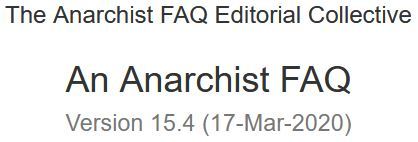
I.2.3 How is the framework of an anarchist society created?
Anarchists do not abstractly compare a free society with the current one. Rather, we see an organic connection between what is and what could be. In other words, anarchists see the initial framework of an anarchist society as being created under statism and capitalism when working class people organise themselves to resist hierarchy. As Kropotkin argued:
“To make a revolution it is not … enough that there should be … [popular] risings … It is necessary that after the risings there should be something new in the institutions [that make up society], which would permit new forms of life to be elaborated and established.” [The Great French Revolution, vol. 1, p. 200]
Anarchists have seen these new institutions as being linked with the need of working class people to resist the evils of hierarchy, capitalism and statism, as being the product of the class struggle and attempts by working class people to resist authority, oppression and exploitation. Thus the struggle of working class people to protect and enhance their liberty under hierarchical society will be the basis for a society without hierarchy. This basic insight allowed anarchists like Bakunin and Proudhon to predict future developments in the class struggle such as workers’ councils (such as those which developed during the 1905 and 1917 Russian Revolutions). As Oskar Anweiler notes in his definitive work on the Russian Soviets (Workers’ Councils):
“Proudhon’s views are often directly associated with the Russian councils … Bakunin …, much more than Proudhon, linked anarchist principles directly to revolutionary action, thus arriving at remarkable insights into the revolutionary process that contribute to an understanding of later events in Russia … “In 1863 Proudhon declared … ‘All my economic ideas as developed over twenty-five years can be summed up in the words: agricultural-industrial federation. All my political ideas boil down to a similar formula: political federation or decentralisation.’ … Proudhon’s conception of a self-governing state [sic!] founded on producers’ corporations [i.e. federations of co-operatives], is certainly related to the idea of ‘a democracy of producers’ which emerged in the factory soviets. To this extent Proudhon can be regarded as an ideological precursor of the councils … “Bakunin … suggested the formation of revolutionary committees with representatives from the barricades, the streets, and the city districts, who would be given binding mandates, held accountable to the masses, and subject to recall. These revolutionary deputies were to form the ‘federation of the barricades,’ organising a revolutionary commune to immediately unite with other centres of rebellion … “Bakunin proposed the formation of revolutionary committees to elect communal councils, and a pyramidal organisation of society ‘through free federation from the bottom upward, the association of workers in industry and agriculture — first in the communities, then through federation of communities into districts, districts into nations, and nations into international brotherhood.’ These proposals are indeed strikingly similar to the structure of the subsequent Russian system of councils … “Bakunin’s ideas about spontaneous development of the revolution and the masses’ capacity for elementary organisation undoubtedly were echoed in part by the subsequent soviet movement… Because Bakunin … was always very close to the reality of social struggle, he was able to foresee concrete aspects of the revolution. The council movement during the Russian Revolution, though not a result of Bakunin’s theories, often corresponded in form and progress to his revolutionary concepts and predictions.” [The Soviets, pp. 8–11]
“As early as the 1860’s and 1870’s,” Paul Avrich also noted, “the followers of Proudhon and Bakunin in the First International were proposing the formation of workers’ councils designed both as a weapon of class struggle against capitalists and as the structural basis of the future libertarian society.” [The Russian Anarchists, p. 73]
In this sense, anarchy is not some distant goal but rather an aspect of the current struggles against domination, oppression and exploitation (i.e. the class struggle, to use an all-embracing term, although we must stress that anarchists use this term to cover all struggles against domination). “Anarchism,” argued Kropotkin, “is not a mere insight into a remote future. Already now, whatever the sphere of action of the individual, he [or she] can act, either in accordance with anarchist principles or on an opposite line.” It was “born among the people — in the struggles of real life” and “owes its origin to the constructive, creative activity of the people.” [Anarchism, p. 75, p. 150 and p. 149] Thus, “Anarchism is not … a theory of the future to be realised by divine inspiration. It is a living force in the affairs of our life, constantly creating new conditions.” It “stands for the spirit of revolt” and so ”[d]irect action against the authority in the shop, direct action against the authority of the law, of direct action against the invasive, meddlesome authority of our moral code, is the logical, consistent method of Anarchism.” [Emma Goldman, Anarchism and Other Essays, p. 63 and p. 66]
Anarchism draws upon the autonomous self-activity and spontaneity of working class people in struggle to inform both its political theory and its vision of a free society. The struggle against hierarchy teaches us not only how to be anarchists but also gives us a glimpse of what an anarchist society would be like, what its initial framework could be and the experience of managing our own activities which is required for such a society to function successfully.
Therefore, as is clear, anarchists have long had a clear vision of what an anarchist society would look like and, equally as important, where such a society would spring from (as we proved in section H.1.4 Lenin’s assertion that anarchists “have absolutely no clear idea of what the proletariat will put in its [the states] place” is simply false). It would, therefore, be useful to give a quick summary of anarchist views on this subject.
Proudhon, for example, looked to the self-activity of French workers, artisans and peasants and used that as the basis of his ideas on anarchism. While seeing such activity as essentially reformist in nature, like subsequent revolutionary anarchists he saw the germs of anarchy “generating from the bowels of the people, from the depths of labour, a greater authority, a more potent fact, which shall envelop capital and the State and subjugate them” as “it is of no use to change the holders of power or introduce some variation into its workings: an agricultural and industrial combination must be found by means of which power, today the ruler of society, shall become its slave.” [System of Economical Contradictions, p. 399 and p. 398] Workers should follow the example of those already creating co-operatives:
“Do not the workmen’s unions at this moment serve as the cradle for the social revolution … ? Are they not always the open school, both theoretical and practical, where the workman learns the science of the production and distribution of wealth, where he studies, without masters and without books, by his own experience solely, the laws of … industrial organisation … ?” [General Idea of the Revolution, p. 78]
Attempts to form workers associations, therefore, “should be judged, not by the more or less successful results which they obtain, but only according to their silent tendency to assert and establish the social republic.” The “importance of their work lies, not in their petty union interests, but in their denial of the rule of capitalists, money lenders and governments.” They “should take over the great departments of industry, which are their natural inheritance.” [Op. Cit., p. 98–9]
This linking of the present and the future through the self-activity and self-organisation of working class people is also found in Bakunin. Unlike Proudhon, Bakunin stressed revolutionary activity and so he saw the militant labour movement, and the revolution itself, as providing the basic structure of a free society. As he put it, “the organisation of the trade sections and their representation in the Chambers of Labour … bear in themselves the living seeds of the new society which is to replace the old one. They are creating not only the ideas, but also the facts of the future itself.” [Bakunin on Anarchism, p. 255]
The needs of the class struggle would create the framework of a new society, a federation of workers councils, as “strikes indicate a certain collective strength already, a certain understanding among the workers … each strike becomes the point of departure for the formation of new groups.” [The Basic Bakunin, pp. 149–50] This pre-revolutionary development would be accelerated by the revolution itself:
“the revolution must set out from the first to radically and totally destroy the State … The natural and necessary consequence of this destruction will be … [among others, the] dissolution of army, magistracy, bureaucracy, police and priesthood… confiscation of all productive capital and means of production on behalf of workers’ associations, who are to put them to use … the federative Alliance of all working men’s associations … [will] constitute the Commune . .. [the] Communal Council [will be] composed of … delegates … vested with plenary but accountable and removable mandates… all provinces, communes and associations … by first reorganising on revolutionary lines … [will] constitute the federation of insurgent associations, communes and provinces … [and] organise a revolutionary force capable defeating reaction … [and for] self-defence … [The] revolution everywhere must be created by the people, and supreme control must always belong to the people organised into a free federation of agricultural and industrial associations … organised from the bottom upwards by means of revolutionary delegation.” [Michael Bakunin: Selected Writings, pp. 170–2]
Like Bakunin, Kropotkin stressed that revolution transformed those taking part in it. As he noted in his classic account of the French Revolution, “by degrees, the revolutionary education of the people was being accomplished by the revolution itself.” Part of this process involved creating new organisations which allowed the mass of people to take part in the decision making of the revolution. He pointed to “the popular Commune,” arguing that “the Revolution began by creating the Commune … and through this institution it gained … immense power.” He stressed that it was “by means of the ‘districts’ [of the Communes] that … the masses, accustoming themselves to act without receiving orders from the national representatives, were practising what was to be described later as Direct Self-Government.” Such a system did not imply isolation, for while “the districts strove to maintain their own independence” they also “sought for unity of action, not in subjection to a Central Committee, but in a federative union.” The Commune “was thus made from below upward, by the federation of the district organisations; it spring up in a revolutionary way, from popular initiative.” Thus the process of class struggle, of the needs of the fighting against the existing system, generated the framework of an anarchist society for “the districts of Paris laid the foundations of a new, free, social organisation.” Little wonder he argued that “the principles of anarchism … already dated from 1789, and that they had their origin, not in theoretical speculations, but in the deeds of the Great French Revolution” and that “the libertarians would no doubt do the same to-day.” [The Great French Revolution, vol. 1, p. 261, p. 200, p. 203, p. 206, p. 204 and p. 206]
Similarly, as we noted in section H.2.6 we discover him arguing in Mutual Aid that strikes and labour unions were an expression of mutual aid in capitalist society. Elsewhere, Kropotkin argued that “labour combinations” like the “Sections” of French revolution were one of the “main popular anarchist currents” in history, expressing the “same popular resistance to the growing power of the few.” [Anarchism, p. 159] For Kropotkin, like Bakunin, libertarian labour unions were “natural organs for the direct struggle with capitalism and for the composition of the future social order.” [quoted by Paul Avrich, The Russian Anarchists, p. 81]
As can be seen, the major anarchist thinkers pointed to forms of organisation autonomously created and managed by the working class as the framework of an anarchist society. Both Bakunin and Kropotkin pointed to militant, direct action based labour unions while Proudhon pointed towards workers’ experiments in co-operative production and mutual credit. Later anarchists followed them. The anarcho-syndicalists, like Bakunin and Kropotkin, pointed to the developing labour movement as the framework of an anarchist society, as providing the basis for the free federation of workers’ associations which would constitute the commune. Others, such as the Russians Maximov, Arshinov, Voline and Makhno, saw the spontaneously created workers’ councils (soviets) of 1905 and 1917 as the basis of a free society, as another example of Bakunin’s federation of workers’ associations.
Thus, for all anarchists, the structural framework of an anarchist society was created by the class struggle, by the needs of working class people to resist oppression, exploitation and hierarchy. As Kropotkin stressed, ”[d]uring a revolution new forms of life will always germinate on the ruins of the old forms … It is impossible to legislate for the future. All we can do is vaguely guess its essential tendencies and clear the road for it.” [Evolution and Environment, pp. 101–2] These essential tendencies were discovered, in practice, by the needs of the class struggle. The necessity of practising mutual aid and solidarity to survive under capitalism (as in any other hostile environment) makes working people and other oppressed groups organise together to fight their oppressors and exploiters. Thus the co-operation necessary for a libertarian socialist society, like its organisational framework, would be generated by the need to resist oppression and exploitation under capitalism. The process of resistance produces organisation on a wider and wider scale which, in turn, can become the framework of a free society as the needs of the struggle promote libertarian forms of organisation such as decision making from the bottom up, autonomy, federalism, mandated delegates subject to instant recall and so on.
For example, a strikers’ assembly would be the basic decision-making forum in a struggle for improved wages and working conditions. It would create a strike committee to implement its decisions and send delegates to spread the strike. These delegates inspire other strikes, requiring a new organisation to co-ordinate the struggle. This results in delegates from all the strikes meeting and forming a federation (a workers’ council). The strikers decide to occupy the workplace and the strike assemblies take over the means of production. The strike committees become the basis for factory committees which could administer the workplaces, based on workers’ self-management via workplace assemblies (the former strikers’ assemblies). The federation of strikers’ delegates becomes the local communal council, replacing the existing state with a self-managed federation of workers’ associations. In this way, the class struggle creates the framework of a free society.
This, obviously, means that any suggestions of how an anarchist society would look like are based on the fact that the actual framework of a free society will be the product of actual struggles. This means that the form of the free society will be shaped by the process of social change and the organs it creates. This is an important point and worth repeating.
So, as well as changing themselves while they change the world, a people in struggle also create the means by which they can manage society. By having to organise and manage their struggles, they become accustomed to self-management and self-activity and create the possibility of a free society and the organisations which will exist within it. Anarchy is not a jump into the dark but rather a natural progression of the struggle for freedom in an unfree society. The contours of a free society will be shaped by the process of creating it and, therefore, will not be an artificial construction imposed on society. Rather, it will be created from below up by society itself as working class people start to break free of hierarchy. The class struggle thus transforms those involved as well as society and creates the organisational structure and people required for a libertarian society.
This clearly suggests that the means anarchists support are important as they are have a direct impact on the ends they create. In other words, means influence ends and so our means must reflect the ends we seek and empower those who use them. As the present state of affairs is based on the oppression, exploitation and alienation of the working class, any tactics used in the pursuit of a free society must be based on resisting and destroying those evils. This is why anarchists stress tactics and organisations which increase the power, confidence, autonomy, initiative, participation and self-activity of oppressed people. As we indicate in section J (“What Do Anarchists Do?”) this means supporting direct action, solidarity and self-managed organisations built and run from the bottom-up. Only by fighting our own battles, relying on ourselves and our own abilities and power, in organisations we create and run ourselves, can we gain the power and confidence and experience needed to change society for the better and, hopefully, create a new society in place of the current one.
Needless to say, a revolutionary movement will never, at its start, be purely anarchist:
“All of the workers’ and peasants’ movements which have taken place .. . have been movements within the limits of the capitalist regime, and have been more of less tinged with anarchism. This is perfectly natural and understandable. The working class do not act within a world of wishes, but in the real world where they are daily subjected to the physical and psychological blows of hostile forces … the workers continually feel the influence of all the real conditions of the capitalist regime and of intermediate groups … Consequently it is natural that the struggle which they undertake inevitably carries the stamp of various conditions and characteristics of contemporary society. The struggle can never be born in the finished and perfected anarchist form which would correspond to all the requirements of the ideas … When the popular masses engage in a struggle of large dimensions, they inevitably start by committing errors, they allow contradictions and deviations, and only through the process of this struggle do they direct their efforts in the direction of the ideal for which they are struggling.” [Peter Arshinov, The History of the Makhnovist Movement, pp. 239–40]
The role of anarchists is “to help the masses to take the right road in the struggle and in the construction of the new society” and “support their first constructive efforts, assist them intellectually.” However, the working class “once it has mastered the struggle and begins its social construction, will no longer surrender to anyone the initiative in creative work. The working class will then direct itself by its own thought; it will create its society according to its own plans.” [Arshinov, Op. Cit., pp. 240–1] All anarchists can do is help this process by being part of it, arguing our case and winning people over to anarchist ideas (see section J.3 for more details). Thus the process of struggle and debate will, hopefully, turn a struggle against capitalism and statism into one for anarchism. In other words, anarchists seek to preserve and extend the anarchistic elements that exist in every struggle and to help them become consciously libertarian by discussion and debate as members of those struggles.
Lastly, we must stress that it is only the initial framework of a free society which is created in the class struggle. As an anarchist society develops, it will start to change and develop in ways we cannot predict. The forms in which people express their freedom and their control over their own lives will, by necessity, change as these requirements and needs change. As Bakunin argued:
“Even the most rational and profound science cannot divine the form social life will take in the future. It can only determine the negative conditions, which follow logically from a rigorous critique of existing society. Thus, by means of such a critique, social and economic science rejected hereditary individual property and, consequently, took the abstract and, so to speak, negative position of collective property as a necessary condition of the future social order. In the same way, it rejected the very idea of the state or statism, meaning government of society from above downward … Therefore, it took the opposite, or negative, position: anarchy, meaning the free and independent organisation of all the units and parts of the community and their voluntary federation from below upward, not by the orders of any authority, even an elected one, and not by the dictates of any scientific theory, but as the natural development of all the varied demands put forth by life itself. “Therefore no scholar can teach the people or even define for himself how they will and must live on the morrow of the social revolution. That will be determined first by the situation of each people, and secondly by the desires that manifest themselves and operate most strongly within them.” [Statism and Anarchy, pp. 198–9]
So while it will be reasonable to conclude that, for example, the federation of strike/factory assemblies and their councils/committees will be the framework by which production will initially be organised, this framework will mutate to take into account changing production and social needs. The actual structures created will, by necessity, be transformed as industry is transformed from below upwards to meet the real needs of society and producers as both the structure and nature of work and industry developed under capitalism bears the marks of its economic class, hierarchies and power (“a radical social ecology not only raises traditional issues such as the reunion of agriculture with industry, but also questions the very structure of industry itself.” [Murray Bookchin, The Ecology of Freedom, p. 408]). Therefore, under workers’ self-management industry, work and the whole structure and organisation of production will be transformed in ways we can only guess at today. We can point the general direction (i.e. self-managed, ecologically balanced, decentralised, federal, empowering, creative and so on) but that is all. Similarly, as cities and towns are transformed into ecologically integrated communes, the initial community assemblies and their federations will transform along with the transformation of our surroundings. What they will evolve into we cannot predict, but their fundamentals of instant recall, delegation over representation, decision making from the bottom up, and so on will remain.
So, while anarchists see “the future in the present” as the initial framework of a free society, we recognise that such a society will evolve and change. However, the fundamental principles of a free society will not change and so it is useful to present a summary of how such a society could work, based on these principles.
#anarchist society#practical#practical anarchism#practical anarchy#faq#anarchy faq#revolution#anarchism#daily posts#communism#anti capitalist#anti capitalism#late stage capitalism#organization#grassroots#grass roots#anarchists#libraries#leftism#social issues#economy#economics#climate change#climate crisis#climate#ecology#anarchy works#environmentalism#environment#solarpunk
4 notes
·
View notes